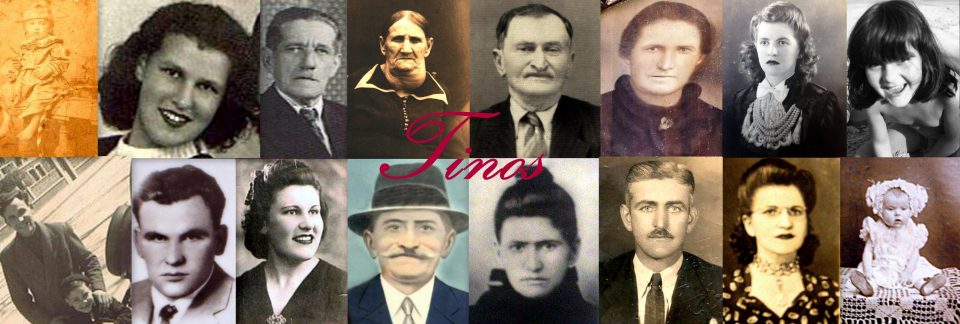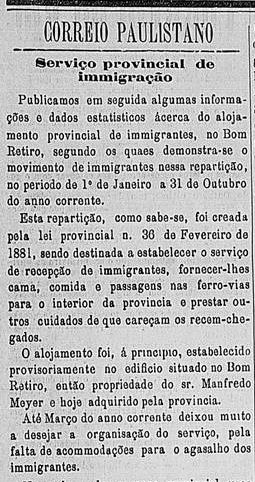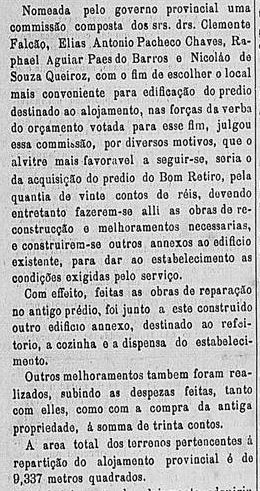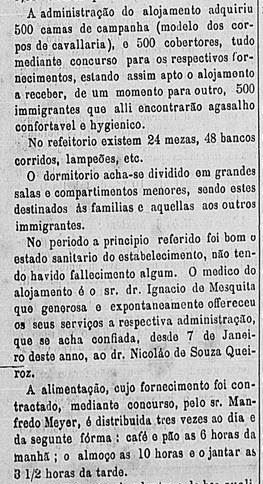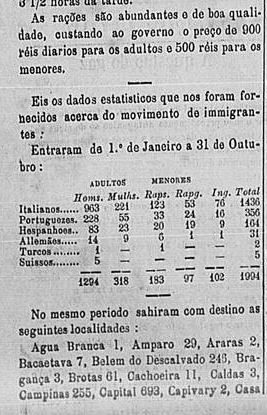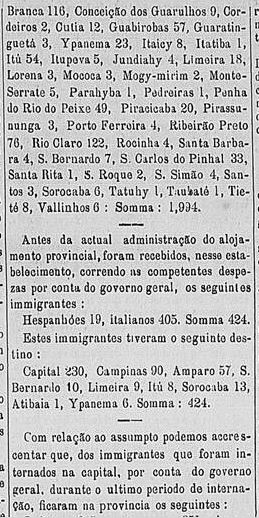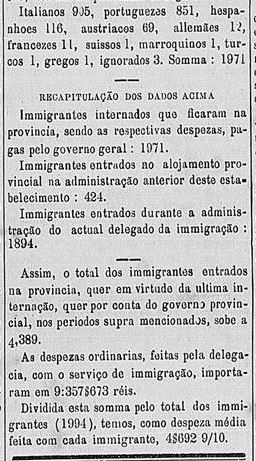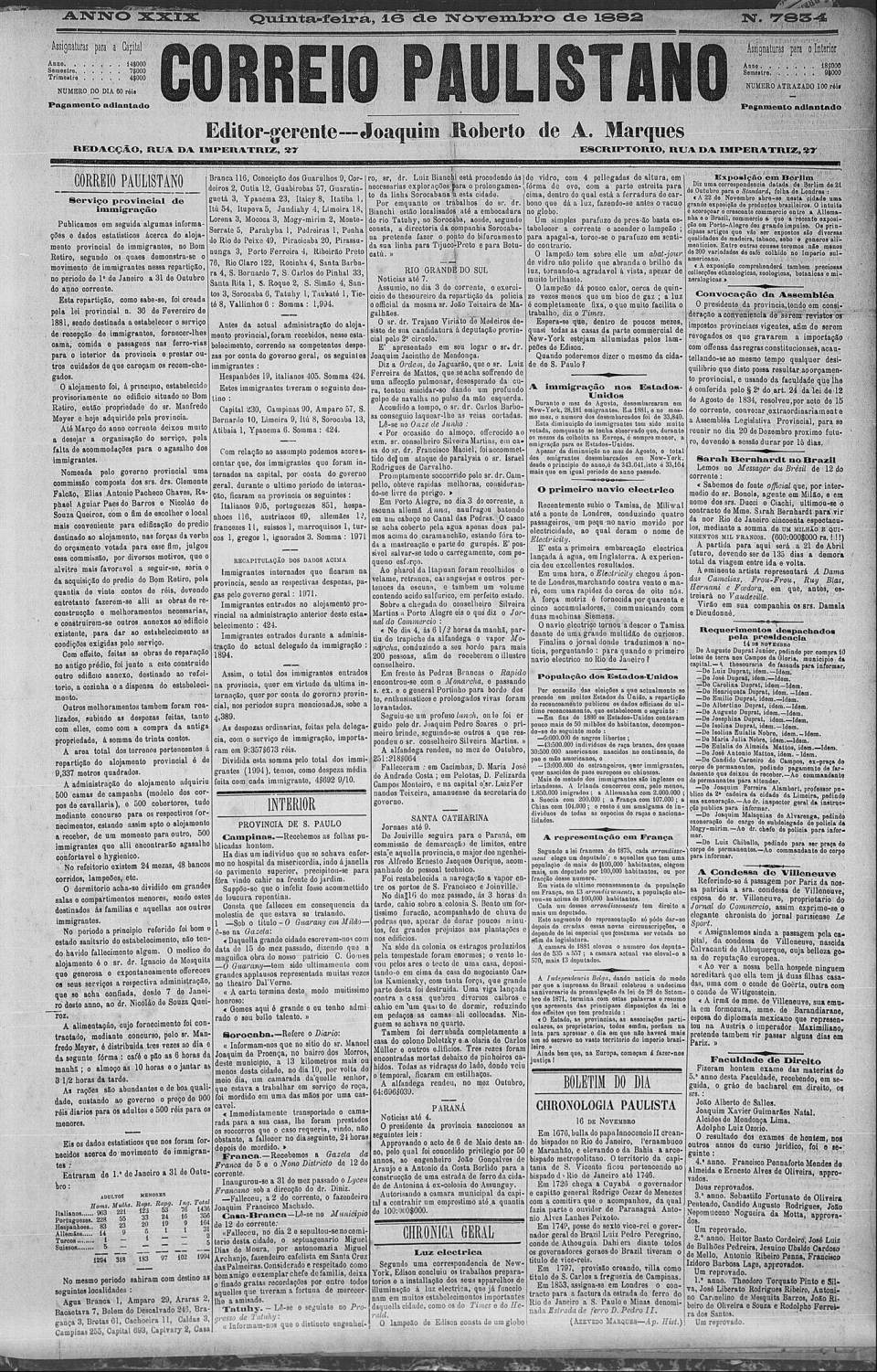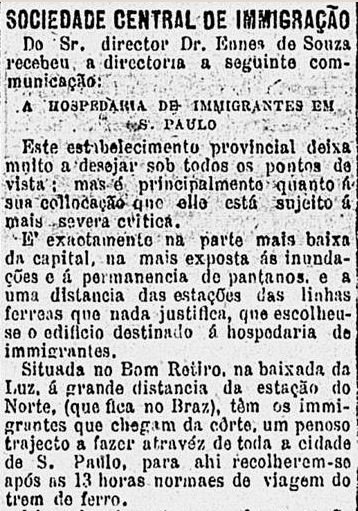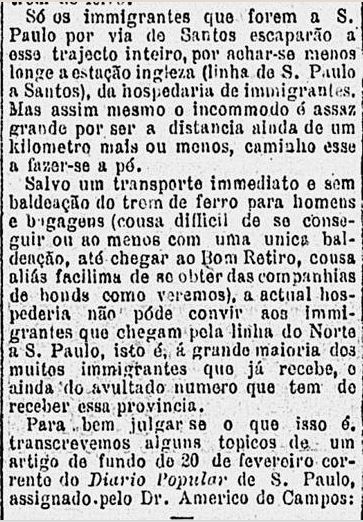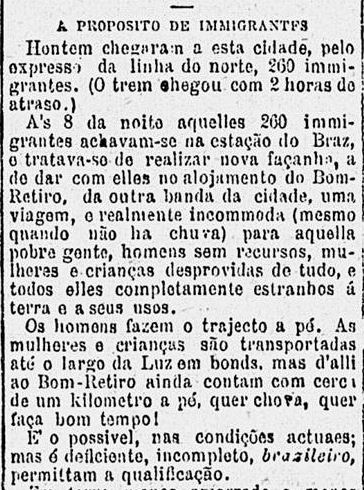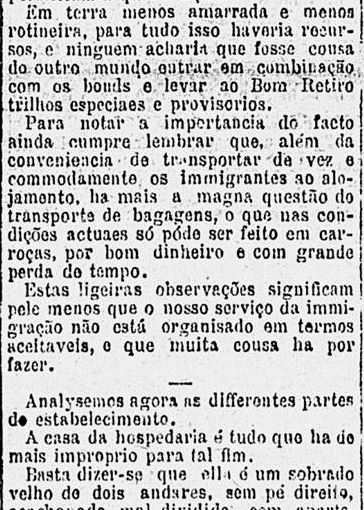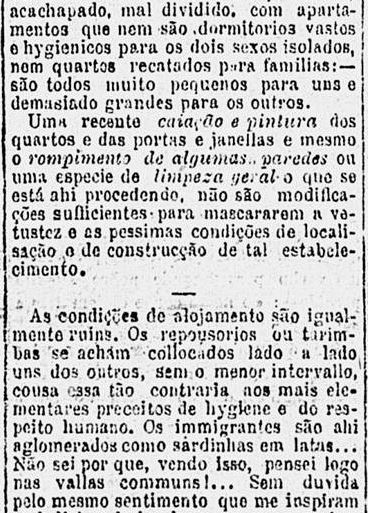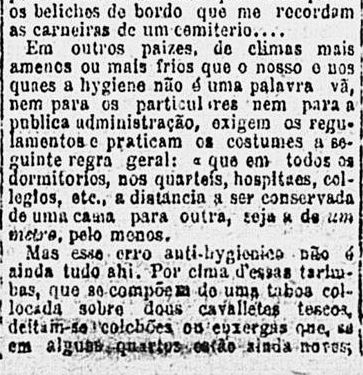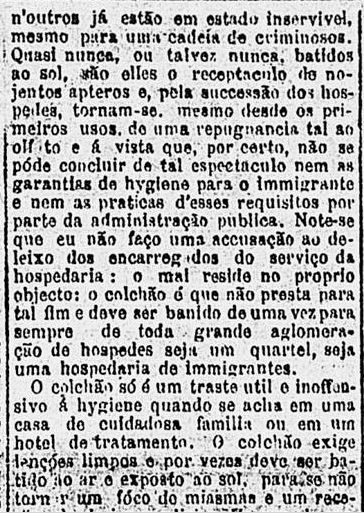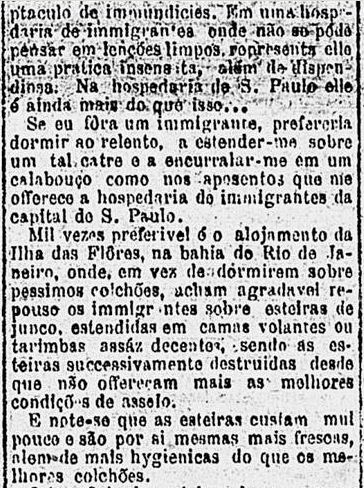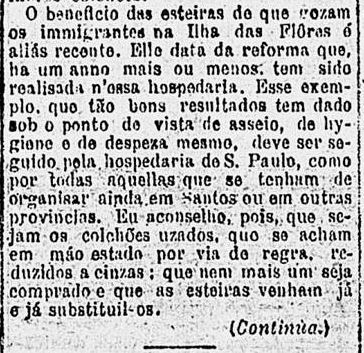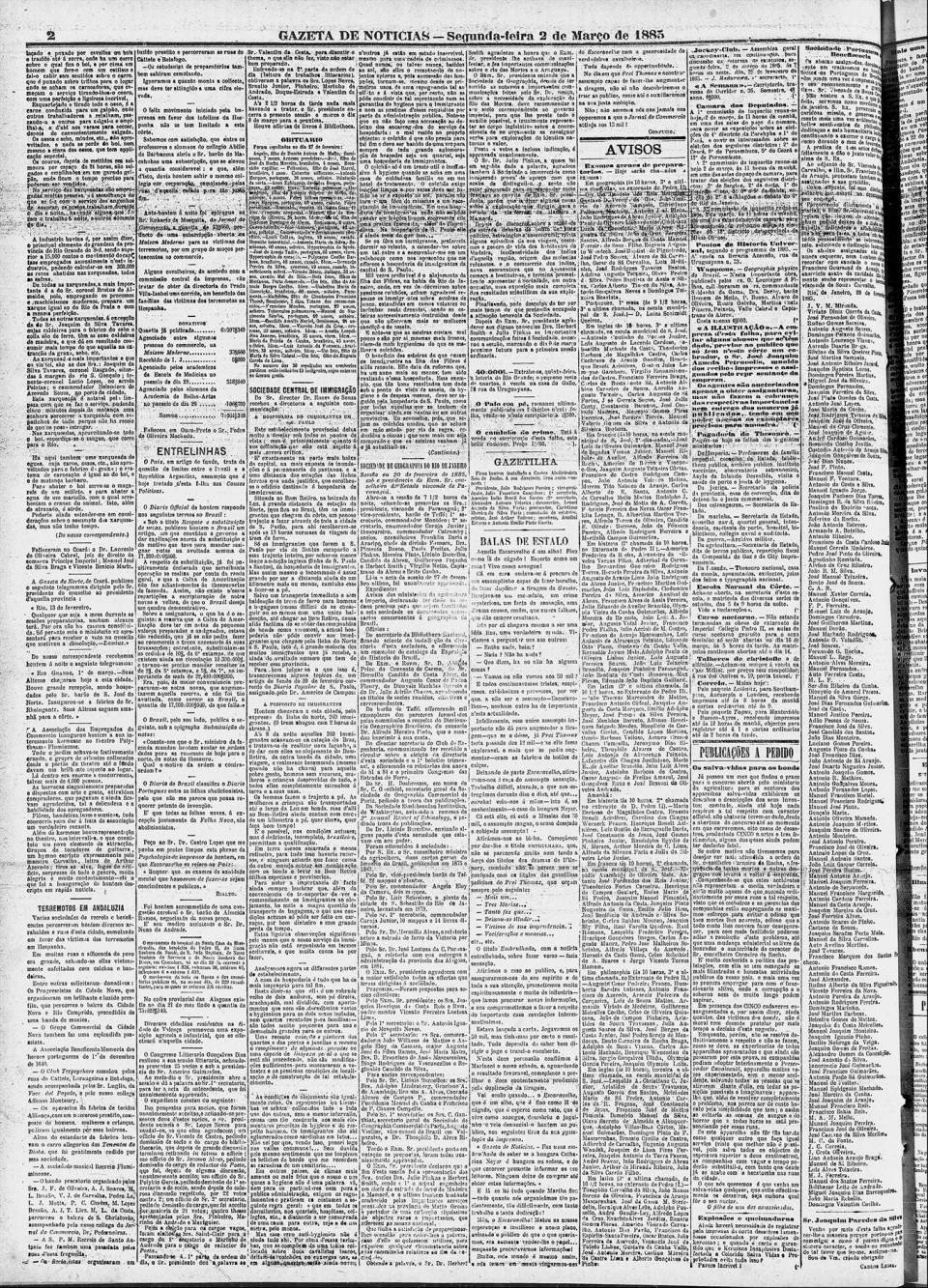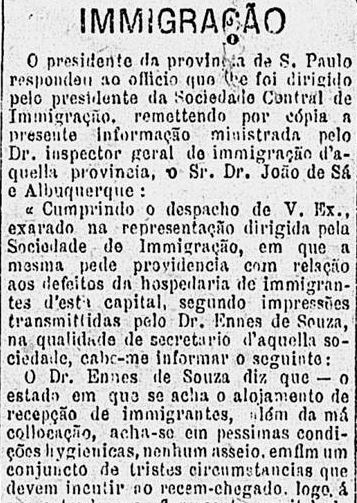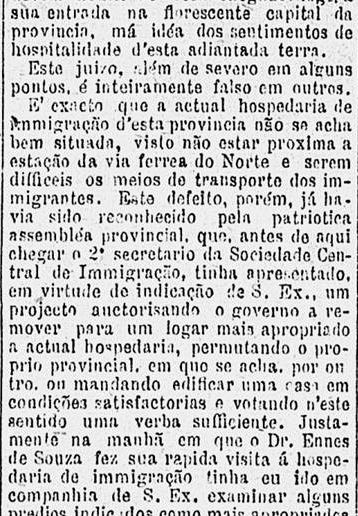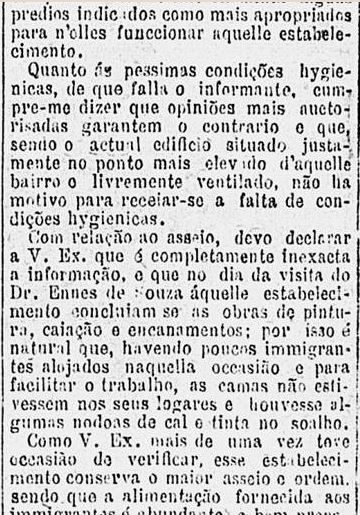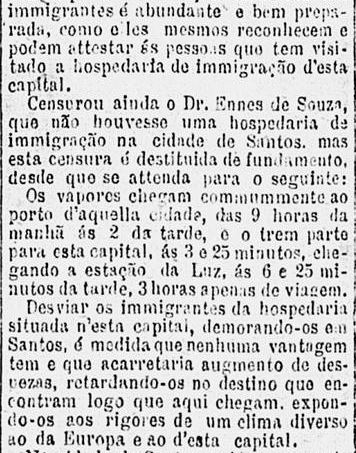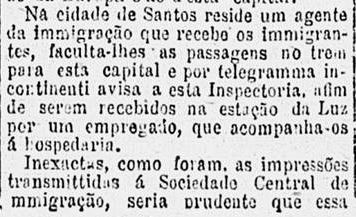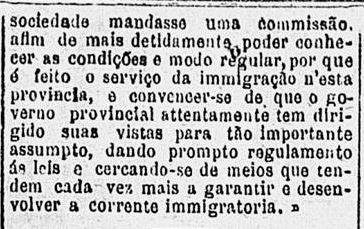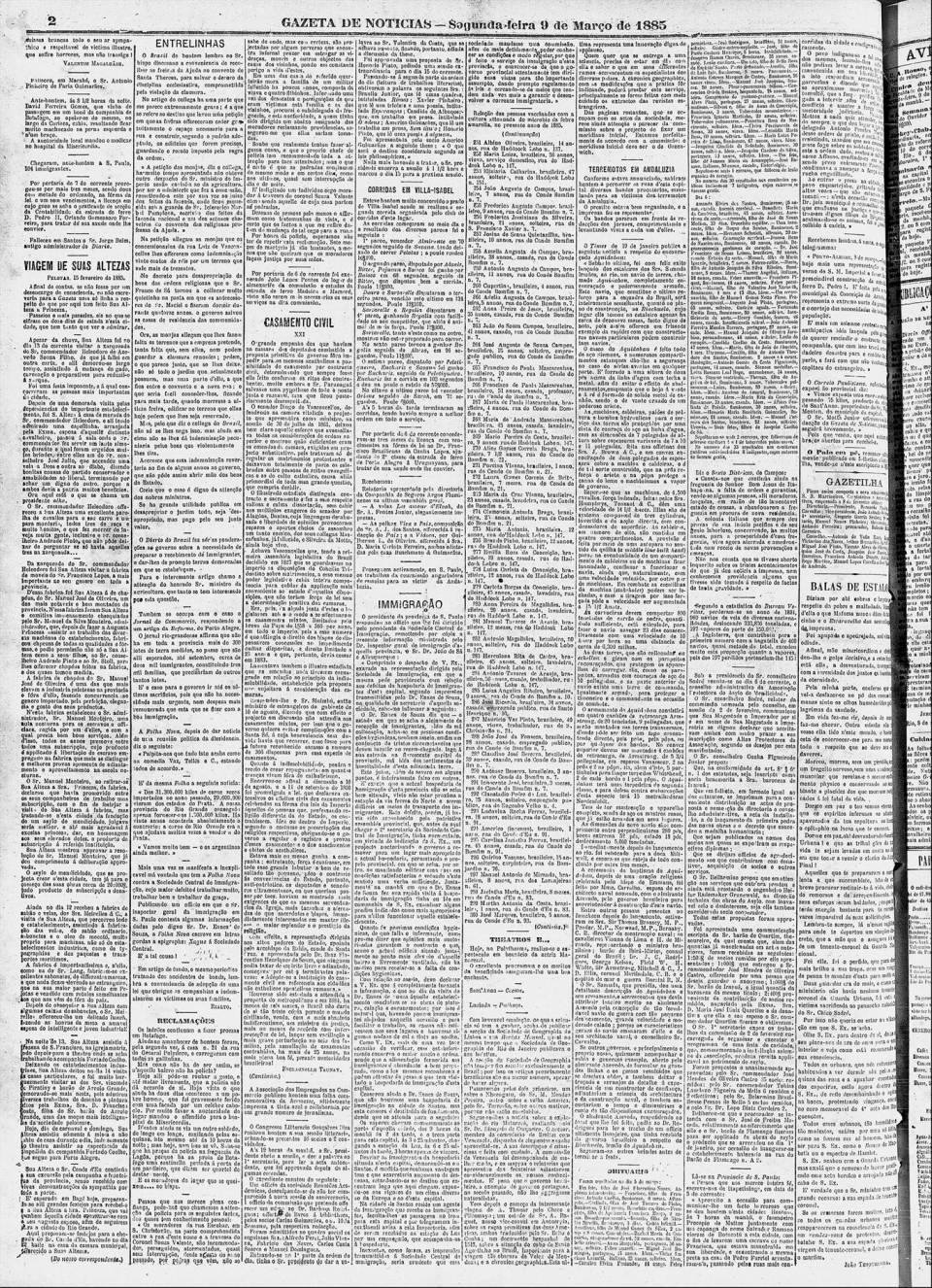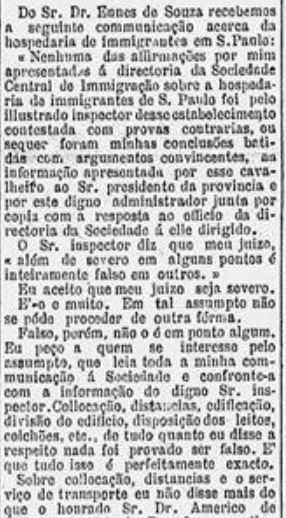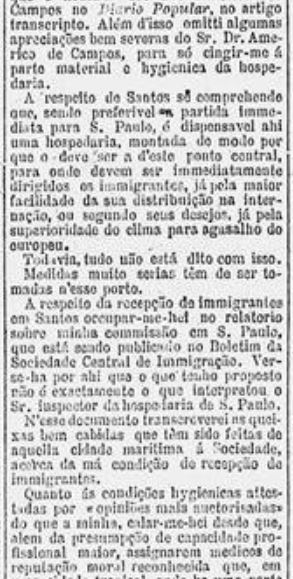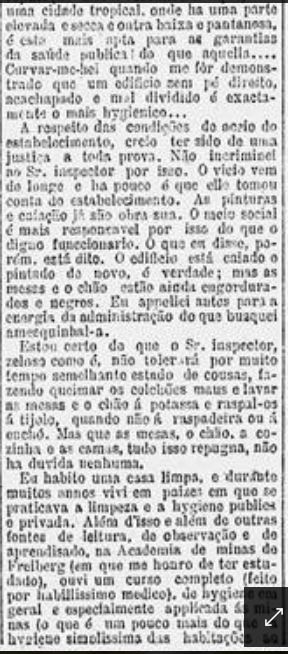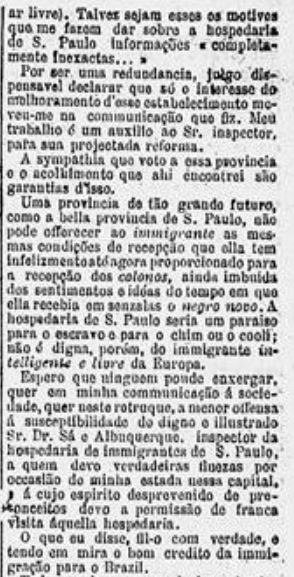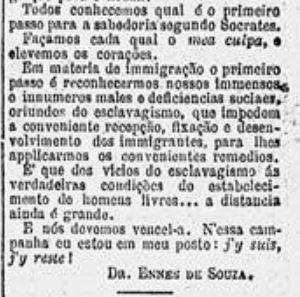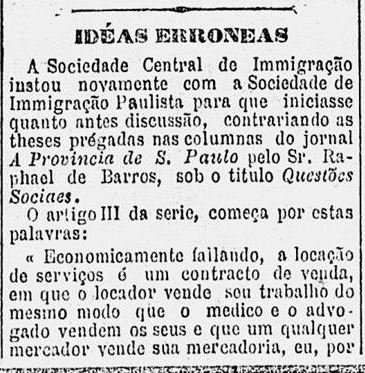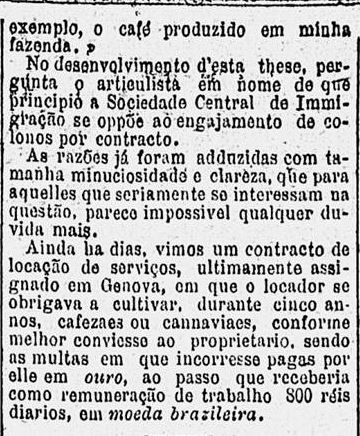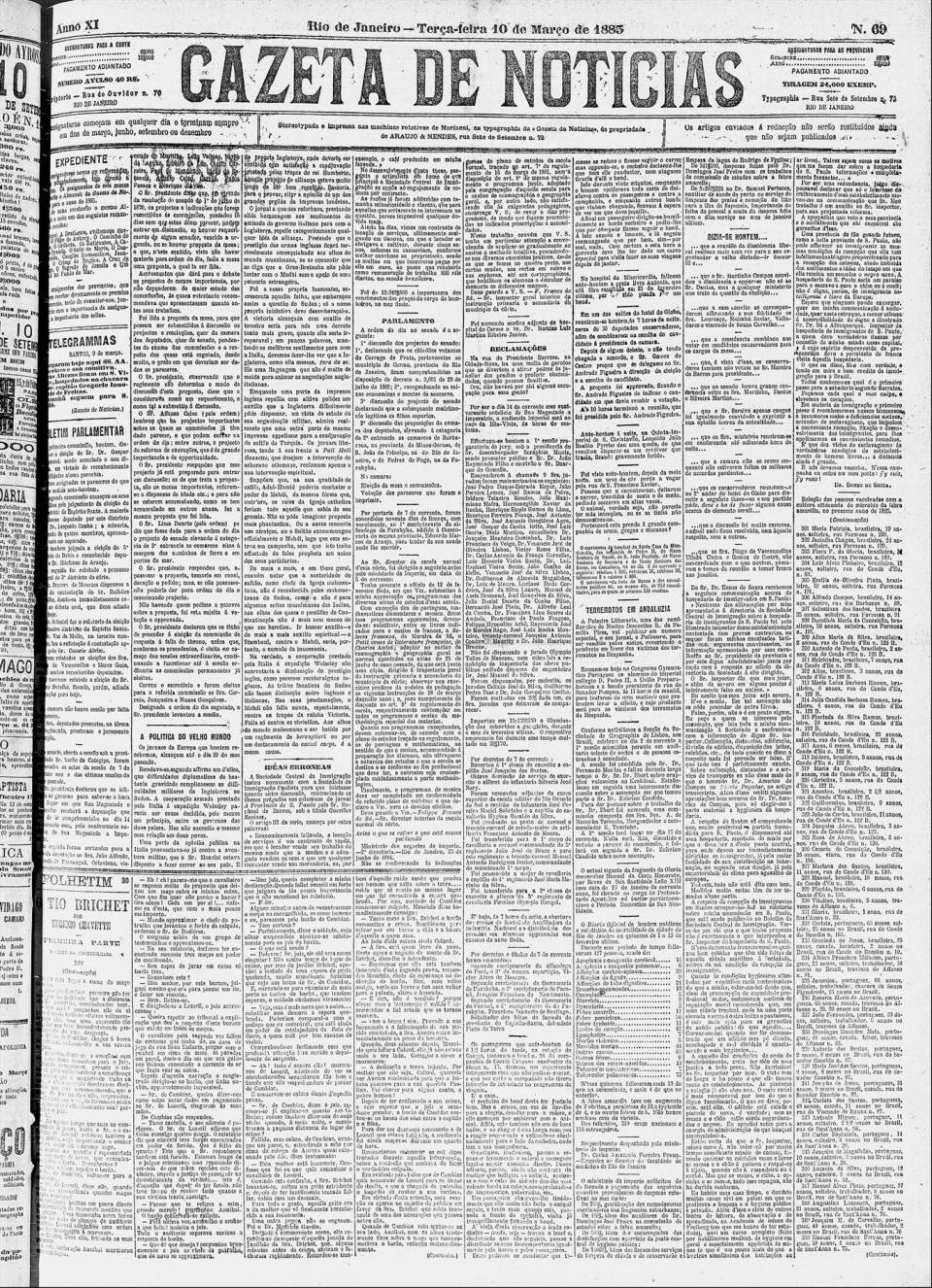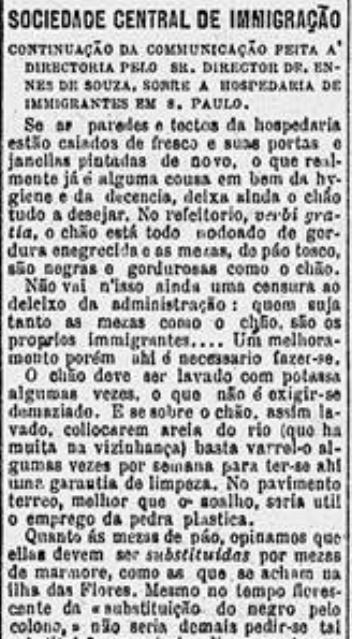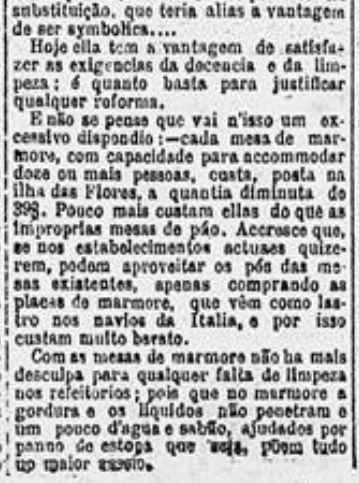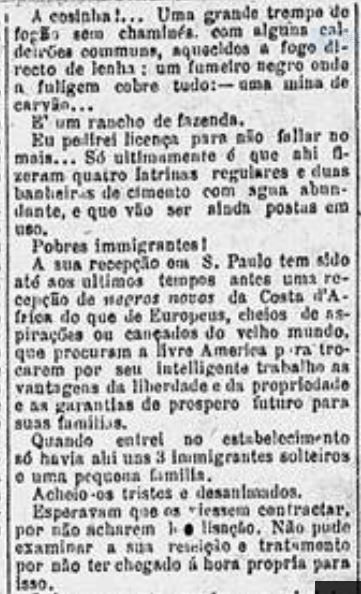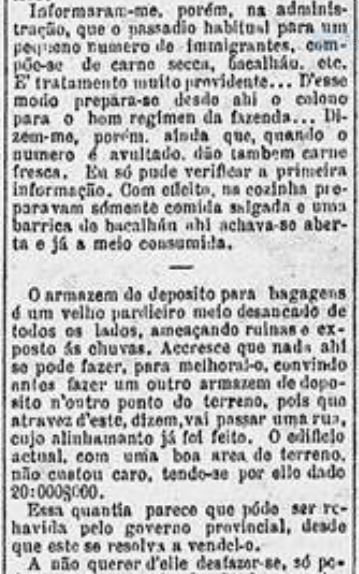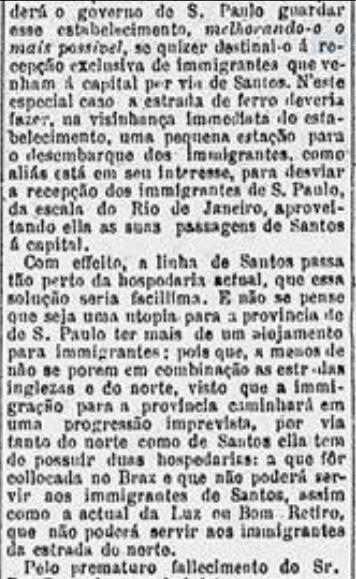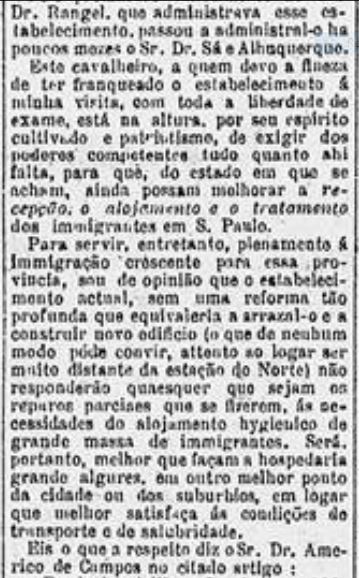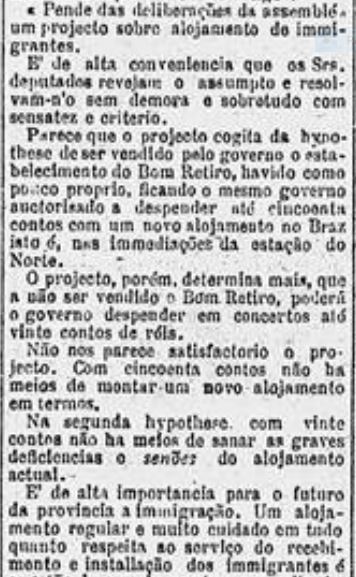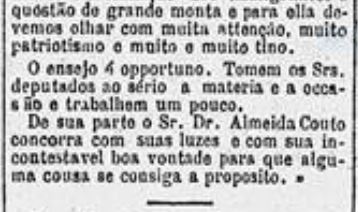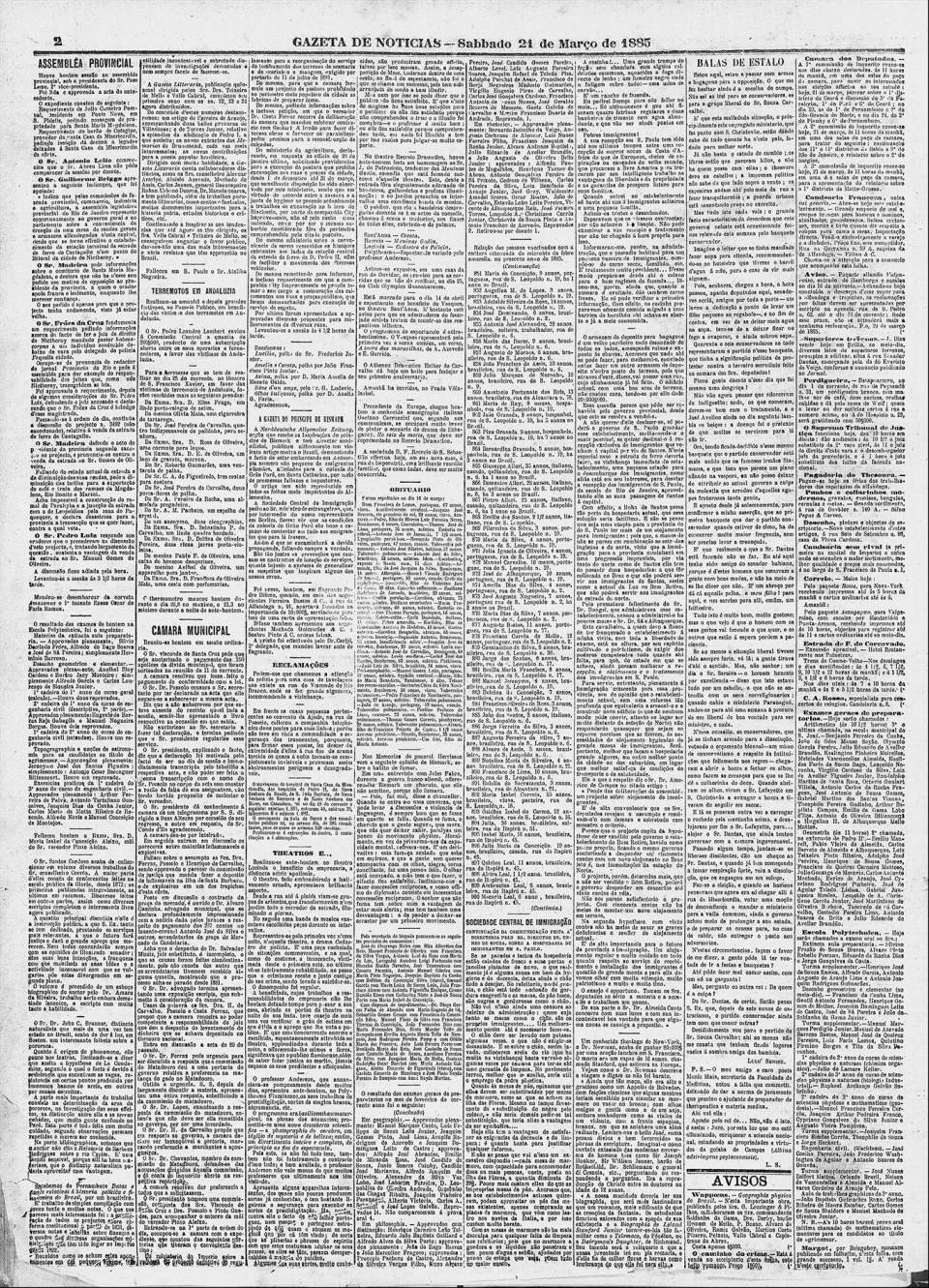IMMIGRANTS’S HOSTELRY IN BOM RETIRO
HOSPEDARIA DOS IMIGRANTES NO BOM RETIRO
– Five articles about the immigrant’s hostel at Bom Retiro prior to the Tinos family’s arrival. Brasil.
Cinco artigos sobre a Hospedaria do Bom Retiro antes da chegada da Família Tinos.
1) Correio Paulistano 16/11/1882 – São Paulo, Brasil.
The Immigrant Hostel at Bom Retiro, when it was founded in February 1881, was well equipped to accommodate 500 beds and serve 3 meals a day – breakfast 6am, lunch 10am, dinner 3.30pm- and to provide medical services.
A Hospedaria dos Imigrantes no Bom Retiro quando foi fundada em fevereiro de 1881, estava bem equipada para acomodar 500 camas e servir 3 refeições por dia – café da manha as 6h, almoço as 10h e jantar as 15h30min – e para prestar serviços médicos).
Transcription / Transcrição – (Correio Paulistano 16/11/1882)
Correio Paulistano – Serviço provincial de immigração – Publicamos em seguida algumas informações e dados estatisticos ácerca do alojamento provincial de immigrantes, no Bom Retiro, segundo os quaes, demonstra-se o movimento de immigrantes nessa repartição, no periodo de primeiro de Janeiro a 31 de Outubro do anno corrente.
Esta reparticção, como sabe-se, foi creada pela lei provincial n. 36 de Fevereiro de 1881, sendo destinada a estabelecer o serviço de recepção de immigrantes, fornecer-lhes cama, comida e passagens nas ferrovias para o interior da provincia e prestar outros cuidados de que careçam os recem-chegados.
O alojamento foi, á principio, estabelecido provisoriamente no edificio situado no Bom Retiro, então propriedade do sr. Manfredo Meyer e hoje adquirido pela provincia.
Até Março do anno corrente deixou muito a desejar a organzação do serviço, pela falta de acommodações para o agasalho dos immigrantes.
Nomeada pelo governo provincial, uma comissão composta dos srs. Clemente Falção, Elias Antonio Pacheco Chaves, Raphael Aguiar Paes de Barros e Nicoláo de Souza Queiroz, com o fim de escolher o local mais conveniente para edificação do predio destinado ao alojamento, nas forças da verba do orçamento votada para esse fim, julgou essa commissão, por diversos motivos, que o alvitro mais favorável a seguir-se seria o da acquisição do predio do Bom retiro pela quantia de vinte contos de réis, devendo entretanto fazerem-se alli as obras de reconstrução e melhoramentos necessarias e construirem-se outros annexos ao edificio existente, para dar ao estabelecimento as condições exigidas pelo serviço.
Com effeito, feitas as obras de reparação no antigo prédio, foi junto a este construido outro edificio annexo, destindo ao refeitorio, a cozinha e a dispensa do estabelecimento.
Outros melhoramentos tambem foram realizados, subindo as despezas feitas, tanto com elles, como com a compra da antiga propriedade, á somma de trinta contos.
A area total dos terrenos pertencentes á repartição do alojamento provincial é de 9.337 metros quadrados.
A administração do alojamento adquiriu 500 camas de campanha (modelo dos corpos de cavallaria), e 500 cobertores, tudo mediante concurso para os respectivos fornecimentos, entando assim apto o alojamento a receber, de um momento para outro, 500 imigrantes, que alli encontração agasalho confortavel e hygienico.
No refeitorio existem 24 mezas, 48 bancos corridos e lampeões, etc.
O dormitório acha-se dividido em grandes salas e compartimentos menores, sendo estes destinados ás familias e aquellas aos outros immigrantes.
No periodo a principio referido foi bom o estado sanitario do estabelecimento, não tendo havido fallescimento algum. O medico do alojamento é o sr. dr. Ignacio de Mesquita que generosa e expontaneamente offereceu os seus serviços a respectiva administração. que se acha confiada, desde 7 de Janeiro deste anno, ao sr. Nicoláo de Souza Queiroz.
A alimentação, cujo fornecimento foi contractado, mediante concurso, pelo sr. Manfredo Meyer, é distribuida tres vezes ao dia e da segunte fórma: café e pão as 6 horas da manhãç o almoço as 10 horas e o jantar as 3 1/2 horas da tarde.
As rações são abundantes e de boa qualidade, custando ao governo o preço de 900 réis diarios para os adultos e 500 réis para os menores.
Eis os dados estatisticos que nos foram fornecidos acerca do movimento de immigrantes. Entraram de 1o de Janeiro a 31 de Outubro:
Adultos Menores
Homes/ mulhers Rapazes / Raparigas Ing. Total
Italianos 953 221 123 53 76 1436
Portuguese 228 55 33 24 16 356
Hespanhoes 83 23 20 19 9 104
Allemãos 14 9 6 1 1 31
Turcos 1 – 1 – – 2
Suissos 5 – – – – 5
No mesmo periodo sahiram com destino as seguintes localidades: Agua Branca 1, Amparo 29, Araras 2, Bacaetava 7, Belem do Descalcvado 245, Bragança 3, Brotas 61, Cachoeira 11, Caldas 3, Campinas 255, Capital 693, Capivary 2, Casa branca 116, Conceição dos Grarulhos 9, Cordeiros 2, Cutia 12, Guabirobas 57, Guaratinguetá 3, Tpanema 23, Italey 8, Itabiba 1, Itú 54, Itupeva 5, Jundiahy 4, Limeira 18, Lorena 3, Mococo 3, Mogy-mirim 2, Monte-Serrate 5, Parahyba1, Pedreiras 1, Penha do Rio do Peixe 49, Piracicaba 20, Pirassununga 3, Porto Ferreira 4, Ribeirão Preto 76, Rio Claro 122, Rocinha 4, Santa barbara 4, S. Bernardo 7, S. Carlos do Pinhal 33, Sabta Rita 1, S. Roque 2, S. Simão 4, Santos 3, Sorocaba 6, Tatuhy 1, Taubaté 1, Tietê 8, Vallinhos 6: Somma: 1994.
Antes da actual administração do alojamento provincial, foram recebidos, nesse estabelecimento, correndo as competentes despezas por conta do governo geral, os seguintes immigrantes: Hespanhóes 19, italianos 405, Somma 424.
Estes immigrantes tiveram os seguinte destino: Capital 230, Campinas 90, Amparo 57, S. bernardo 10, Limeira 9, Itú 8, Sorocaba 13, Atibaia 1, Ypanema 6. Somma 424.
Com relação ao assumpto podemos accrescentar que dos immigrantes que foram internados na capital, por conta do governo geral, durante o ultimo periodo de internação, ficaram na provincia os seguintes: Italianos 935, portuguezes 851, hespanhoes 116, austriacos 69, allemães 12, francezes 14, suissos 1, marroquinos 1, turcos 1, gregos 1, ignorados 3. Somma:1971
Recapitulação dos dados acima
Immigrantes internados que ficaram na provincia, sendo as respectivas despezas pagas pelo governo geral: 1971.
Immigrantes entrados no alojamento provincial na administração anterior deste estabelecimento: 424.
Immigrantes entrados durante a administração do actual delegado da immigração: 1894.
Assim o total dos immigrantes entrados na provincia, quer em virtude da ultima intornação, quer por conta do governo provincial, nos periodos supra mencionados, sobe a 4389.
As despezas ordinarias feitas pela delegacia, com o serviço de immigração, importaram em 9:357$673 réis.
Dividida esta somma pelo total dos immigrantes (1994), temos, como despeza média feita com cada immigrante, 4$692 9/10.
Translation – (Correio Paulistano 16/11/1882)
Correio Paulistano newspaper – Provincial Immigration Service – We publish below some information and statistical data about the provincial hostelry of immigrants, in Bom Retiro, according to which, the movement of immigrants in this division is demonstrated, from January 1st to October 31st of the current year.
This department, as we know, was created by provincial law number 36 of February 1881, and is intended to establish the reception service for immigrants, to provide them with bed, food, and railroad tickets for the interior of the province and to provide other care the new arrived immigrants may need.
The Hostelry was originally provisionally established in the building situated at Bom Retiro, which used to belong to Manfredo Meyer and nowadays was acquired by the province.
Until March of the current year it fell short of service organization, due to the lack of accommodations to shelter the immigrants.
It was named by the provincial government, a commission – composed of Mrs. Clemente Falcao, Elias Antonio Pacheco Chaves, Raphael Aguiar Paes de Barros and Nicoláo de Souza Queiroz – in order to choose the most convenient location for the hostelry building, in the budget funds voted for that purpose. It was judged by this commission , for various reasons, that the most favorable option would be to buy the building in Bom Retiro for twenty counts of réis, however being necessary to do some the reconstruction works and improvements should be made as well as to construct other annexes to the existing building, to give the establishment the conditions required by the service.
As a matter of fact, the repair work was done in the old building, and next to it was built another building, for refectory, kitchen and storage.
Other improvements were also made, raising the expenses incurred both with them and with the purchase of the old property, to the sum of thirty contos.
The total area of land belonging to the provincial hostelry is 9,337 square meters.
The administration of the hostelry purchased 500 camp beds (model cavalry), and 500 blankets, all by means of a tender to choose the respective supplies. Thus fitting the accommodation to receive, from one moment to another, 500 immigrants, who find there comfortable and hygienic shelter.
In the dining room there are 24 tables, 48 benches and gas lamps, etc.
The dormitory is divided into large rooms and smaller compartments, the last for the families and the large rooms for the other immigrants.
In the period referred the establishment has been kept in good sanitary condition, and there was no deaths. The doctor of the lodging is Mr. Dr. Ignacio de Mesquita, who generously and spontaneously offered his services to the respective administration. Mr. Nicoláo de Souza Queiroz has been in charge of the building administration since January 7th of this year.
The contracted food supplier chosen by a tender, is Mr. Manfredo Meyer. The food is distributed three times a day as follows: coffee and bread at 6 o’clock in the morning, lunch at 10 am and dinner at 3 o’clock in the afternoon.
The rations are abundant and of good quality, costing the government the price of 900 reis per adult pas and 500 reis for the children.
Here is the statistical data we have been given about the movement of immigrants. from January 1st to October 31st:
Adults Under 18
men/ women boys / girl Ing. Total
Italians 953 221 123 53 76 1436
Portuguese 228 55 33 24 16 356
Spanish 83 23 20 19 9 104
Germans 14 9 6 1 1 31
Turks 1 – 1 – – 2
Swiss 5 – – – – 5
In the same period, the immigrants left to the following destinations: Agua Branca 1, Amparo 29, Araras 2, Bacaetava 7, Belem do Descalcvado 245, Bragança 3, Brotas 61, Cachoeira 11, Caldas 3, Campinas 255, Capital 693, Capivary 2, Casa branca 116, Conceição dos Grarulhos 9, Cordeiros 2, Cutia 12, Guabirobas 57, Guaratinguetá 3, Tpanema 23, Italey 8, Itabiba 1, Itú 54, Itupeva 5, Jundiahy 4, Limeira 18, Lorena 3, Mococo 3, Mogy-mirim 2, Monte-Serrate 5, Parahyba1, Pedreiras 1, Penha do Rio do Peixe 49, Piracicaba 20, Pirassununga 3, Porto Ferreira 4, Ribeirão Preto 76, Rio Claro 122, Rocinha 4, Santa barbara 4, S. Bernardo 7, S. Carlos do Pinhal 33, Sabta Rita 1, S. Roque 2, S. Simão 4, Santos 3, Sorocaba 6, Tatuhy 1, Taubat~e 1, Tieté 8, Vallinhos 6: Total: 1994.
Before this administration, in the provincial hostelry were received the following immigrantes who had their expenses paid by the General Government: Spanish 19, Italians 405, Total 424.
These immigrants went to the following destinations: Capital 230, Campinas 90, Amparo 57, S. bernardo 10, Limeira 9, Itú 8, Sorocaba 13, Atibaia 1, Ypanema 6. Somma 424.
About this subject we can also add that from the immigrants received in this Capital city Hostelry who were financed by the General Government, during the last period of reception, this are the number who stayed in this province: Italians 935, Portuguese 851, Spanish 116, Austrians 69, Germans 12, French 14, Suisse 1, Moroccans 1, Turks 1, Greeks 1, unknown 3. Total:1971
Recapitulation of the above data:
Immigrants received who stayed in the province, with their the respective expenses paid by the general government: 1971.
Immigrants entered into provincial hostelry in the former administration of this establishment: 424.
Immigrants entered during the administration of the current Immigration Delegate: 1894.
Thus the total of the immigrants entered in the province, either by virtue of the last administration or by the provincial government, in the periods mentioned above, rises to 4389.
Ordinary expenses made by the immigration department, with the immigration service totals 9: 357 $ 673 réis.
Divided this sum by the total of the immigrants (1994), we have, as average expenditure per immigrant of , 4 $ 692 9/10.
2) Gazeta de Notícias 2/3/1885 – Rio de Janeiro, Brasil.
About one month before the Tinos Family’s arrival, Dr. Ennes de Souza, secretary of the Central Immigration Society writes a report about the issues with the Immigrant Hostel at Bom Retiro – bad location in a low area of the city with risk of flood and excessive distance to the (North) train line. Although the walls were recently painted, there is a lack of hygiene evident in the floors and no space between bed mattresses.
Cerca de um mês antes da chegada da Família Tinos, o Dr. Ennes de Souza, secretário da Sociedade Central de Imigração escreve um relatório sobre as precariedades da Hospedaria do Bom Retiro – mal localizada numa área baixa da cidade sujeita á enchentes e longe da linha de trem (do Norte). Apesar da nova pintura das paredes, há falta de higiene no chão e sem espaço entre os colchões das camas.
Transcription / Transcrição – (Gazeta de Notícias 2/3/1885)
SOCIEDADE CENTRAL DE IMMIGRAÇÃO –
Do Sr. director Dr. Ennes de Souza recebeu a directoria a seguinte comunicação:
A HOSPEDARIA DE IMMIGRANTES EM S. PAULO
Este estabelecimento provincial deixa a desejar sob todos os pontos de vista: mas é principalmente quanto á sua collocação que elle está sujeito á mais severa critica.
É exactamente na parte mais baixa da capital, na mais exposta ás inundações e á permanencia de pantanos, e a uma distancia das estações das linhas ferreas que nada justifica, que escolheu-se o edificio destinado á hospedaria de immigrantes.
Situada no Bom Retiro, na baixada da Luz, á grande distancia da estação do Norte, ( que fica no Braz), tem os immigrantes que chegam da côrte, um penoso trajecto a fazer atravéz de toda a cidade de S. Paulo, para ahi recolherem-se após as 13 horas normaes de viagem do trem de ferro.
Só os immigrantes que forem á S.Paulo por via de Santos escaparão a esse trajeto inteiro, por achar-se menos longe a estação ingleza (linha de S. Paulo a Santos), da hospedaria de immigrantes. Bias assim mesmo o incomodo é assaz grande por ser a distancia ainda de um kilometro mais ou menos, caminho esse a fazer-se a pé.
Salvo um transporte immediato e sem baldeação do trem de ferro para homens e bagagens (cousa dificil de se conseguir ou ao menos com uma unica baldeação, até chegar ao Bom Retiro, cousa aliás facilima de se obter das companhias de bonds como veremos), a actual hospedaria não póde convir aos imigrantes que chegam pela linha do Norte a S. Paulo, isto é, á grande maioria dos muitos immigrantes que já recebe, e ainda do avultado numero que tem de receber essa provincia.
Para bem julgar se o que isso é, transcrevemos alguns topicos de um artigo de fundo de 20 de fevereiro corrente do Diario Popular de S. Paulo, assignado pelo Dr. Americo de Campos:
A PROPOSITO DOS IMMIGRANTES
Hontem chegaram a esta cidade, pelo expresso da linha do norte, 260 immigrantes. (O trem chegou com 2 horas de atraso.)
Ás 8 da noite aquelles 260 immigrantes achavam-se na estação do Braz, e tratava-se de realizar nova façanha, a de dar com elles no alojamento do Bom Retiro, da outra banda da cidade, uma viagem, e realmente incommoda (mesmo quando não ha chuva) para aquella pobre gente, homens sem recursos, mulheres e crianças desprovidas de tudo, e todos elles completamente estranhos á terra e a seus usos.
Os homens fazem o trajeto a pé. As mulheres e crianças são transportadas até o largo da Luz em bonds, mas dalli ao Bom Retiro ainda contam com cerca de um kilometro a pé, quer chova, quer faça bom tempo!
É o possivel, nas condições actuaes; mas é deficiente, incompleto, brazileiro, permittam a qualificação.
Em terras menos amarradas e menos rotineiras, para tudo isso haveriam recursos, e ninguém acharia que fosse cousa de outro mundo entrar em combinação, com os bonds e levar ao Bom Retiro trilhos especiaes e provisorios.
Para notar a importancia do facto ainda cumpre lembrar que, além da conveniencia de transportar de vez e commodamente os immigrantes ao alojamento, ha mais a magna questão do transporte de bagagens, o que nas condições actuaes só póde ser feito em carroças, por bom dinheiro e com grande perda de tempo.
Estas ligeiras observações significam pelo menos que o nosso serviço de immigração não está organizado em termos aceitaveis, e que muita cousa ha por fazer.
Analysemos agora as differenes partes do estabelecimento.
A casa da hospedaria é tudo que há de mais improprio para tal fim.
Basta dizer-se que ella é um sobrado velho de dois andares, sem pé direito acachapado, mal dividido, com apartamentos que nem são dormitórios vastos e hygienicos para os dois sexos isolados, nem quartos recatados para familias:- são todos muito pequenos para uns e demasiado grandes para os outros.
Uma recente caiação e pintura dos quartos e das portas e janellas e mesmo o rompimento de algumas paredes ou uma especie de limpeza geral o que se está ahi procedento, não são modificações sufficientes para mascararem a vestustez e as pessimas condições de localização e de construcção de tal estabelecimento.
As condições de alojamento são igualmente ruins. Os repousorios ou tarimbas se acham collocados lado a lado uns dos outros, sem o menor intervallo, cousa essa tão contraria aos mais elementares preceitos de hygiene e do respeito humano. Os immigrantes são ahi aglomerados como sardinhas em latas… Não sei porque, vendo isso, pensei logo nas vallas communs!… Sem duvida pelo mesmo sentimento que me inspiram os beliches de bordo que me recordam as carneiras de um cemiterio….
Em outros paizes, de climas mais amenos ou mais frios que o nosso e nos quaes a hygiene não é palavra vã, nem para os particulares nem para a publica administração os costumes a seguinte regra geral: < que todos os dormitorios, nos quarteis, hospitaes, colegios, etc, a distancia a ser conservada de uma cama para outra, seja a de um metro, pelo menos.
Mas esse erro anti-hygienico não é ainda tudo ahi. Por cima dessas tarimbas, que se compõe de uma taboa colocada sobre dous cavalletes toscos, deitam-se colchões ou enxergas que, se em alguns quartos estão ainda novas; noutros já estão num estado inservivel, mesmo para uma cadeia de criminosos. Quase nunca, ou talvez nunca batidos ao sol, são elles o receptaculo de nojentos apteros e, pela successão dos hospedes, ternam-se mesmo desde os primeiros usos, de uma repugnancia tal ao olfato e á vista que, por certo, não se póde concluir de tal espetaculo nem as garantias de hygiene para o immigrante e nem as praticas desses requesitos por parte da administração publica. Note-se que eu não faço uma accusação ao deleixo dos encarregados do serviço da hospedaria: o mal reside no proprio objecto: o colcão é que não presta para tal fim e deve ser banido de uma vez para sempre de toda grande aglomeração de hospedes seja em quartel, seja uma hospedaria de immigrantes.
O colcão só é um traste util e e inoffensivo á hygiene quando se acha em uma cada de cuidadosa familia ou em um hotel de tratamento. O colcão exige lençóes limpos e por vezes deve ser batido ao ar e exposto ao sol, para se não tornar um foco de miasmas e um recaptaculo de immundicies. Em uma hospedaria de immigrantes onde não se póde pensar em lençóes limpos, representa elle uma pratica insensata, além de dispendiosa. Na hospedaria de S. Paulo elle é ainda mais do que isso…
Se eu fôra um immigrante, preferiria dormir ao relento, a estender-me sobre um tal catre e a encurralar-me em um calabouço como nos aposentos que me offerece a hospedaria de immigrantes da capital de S. Paulo.
Mil vezes preferivel é o alojamento da Ilha das Flores, na bahia do Rio de Janeiro, onde, em vez de dormirem sobre pessimos colchões, acham agradavel repouso os immigrantes sobre esteira de junco, estendidas em camas volantes ou tarimbas assáz decentes, sendo as esteiras successivamente destruidas desde que não offereçam mais as melhores condições de asseio.
E note-se que as esteiras custam muito pouco e são por si mesmas mais frescas, além de mais hygienicas do que os melhores colchões.
O beneficio das esteiras de que gozam os immigrantes na Ilha das Flores é aliás recente. Elle data da reforma que, ha um anno mais ou menos, tem sido realizada nessa hospedaria. Esse exemplo, que tão bons resultados tem dado sob o ponto de vista de asseio, de hygiene e de despeza mesmo, deve ser seguido pela hospedaria de S. Paulo, como por todas aquellas que se tenham de organisar ainda em Santos ou em outras provincias. Eu aconselho, pois, que sejam os colções usados, que se acham em mau estado por via de regra, reduzidos a cinzas; que nem mais um seja comprado e que as esterias venham já a já substitui-los ( continua).
Translation – (Gazeta de Notícias 2/3/1885)
THE IMMIGRANT´S HOSTELRY IN S. PAULO
This provincial establishment is unsatisfactory in all points of view, but it is certainly its collocation which deserves to the most severe criticism.
It is exactly in the lowest part of the capital, in the area most exposed to the floods and to permanence oswamps, and at a distance from the railway stations lines that nothing justifies, why this building was chosen to be the hostelry of immigrants.
Located in Bom Retiro, in the lowland of Luz, at a great distance from the North Station (which is in Braz), the immigrants arriving from the court (Rio de Janeiro) have to endure a painful journey through the city of S. Paulo, after the normal 13-hour train journey.
Only the immigrants who arrive S. Paulo via Santos will escape this entire route, since the English Station (line S. Paulo to Santos), is less distant from the Immigrants hostelry. That said, they will still have the inconvenience of having to walk a kilometer on foot to arrive at the Hostelry.
The ideal option of a direct train for men and baggage straight to the Hostelry is a difficult thing to do. (Or at least just a single transfer change, until arriving at Bom Retiro, is easier to obtain from the bond companies, as we shall see). Therefore the present hostelry is not suitable to the immigrants who arrive by the North line to S. Paulo, that is to say, to the great majority of the many immigrants that we already receive, and still of the large number that will receive this province.
In order to judge what we are talking about, we transcribe some topics from an article of February 20th by the Popular Daily of S. Paulo, signed by Dr. Americo de Campos:
ABOUT THE IMMIGRANTS
Yesterday arrived in this city, by the train line of the north, 260 immigrants. (The train arrived 2 hours late.)
At 8 that night, the 260 immigrants were in the station of Braz, about to start a new challenge, to arrive the lodging of Bom Retiro, on the other side of the city, really troublesome trip (even when there is no rain) for those poor people, men without resources, women and children devoid of everything, and all of them completely foreign to the land and its uses.
Men make the journey on foot. The women and children are transported to the Largo da Luz in bonds, but from there to Bom Retiro , all must walk about a kilometer on foot, whether it’s rain or not!
This is what is possible under current conditions; But is deficient, incomplete, Brazilian, if you allow me the qualification.
In less tied and less lethargic lands, for all this there would be resources, and no one would think it was a matter of another world to make a special deal with the bonds to take temporary rails to Bom Retiro.
To note the importance of this fact, it is still worth remembering that, besides the convenience of transporting immigrants to and from the accommodation, there is also the baggage transport, which under current conditions can only be done in horse carriage, which are expensive and and a great loss of time.
These slight remarks mean at least that our immigration service is not organized on acceptable terms, and that much has yet to be done.
Let us now consider the different parts of the establishment.
The hostelry building is unfit for its end.
Suffice it to say that it is an old two-story townhouse, without right-handed, badly divided, with apartments that are neither vast and hygienic dormitories for the two isolated areas 9 form males and females), nor rooms with privacy for families: – they are all too small for ones and too big for others.
A recent painting of the rooms, doors and windows and; even the breaking of some walls or a kind of general cleaning which is done – it is not enough modifications to mask the look and the terrible conditions of the localization and construction of such establishment.
The housing conditions are equally bad. The beds are placed next to each other, without the slightest interval, which is so contrary to the most elementary precepts of hygiene and human respect. The immigrants are there crowded like sardines in tins … I do not know why, seeing this, I soon thought of the common graves! … No doubt the hostelry bunk beds gives me same sentiment and impression of the tomb drawers of a cemetery ….
In other countries, of milder or colder climates than ours, where hygiene is not a vain word, individuals and public administration are used to follow the same general rule: There should be at least a meter of distance between beds of all dormitories, in quarters, hospitals , Schools, etc.
This anti-hygienic error is not isolated. On top of these wooden platforms, which is composed of board placed on two rough easels, lie mattresses that, if in some rooms are still new; In others they are already in an unusable state, even for being used in a prison of criminals. They are almost never, or perhaps never beaten in the sun, becoming filth by the succession of the guests, even from the earliest uses, such a repugnance smell and terrible sight. We can conclude from such a spectacle that there is no hygiene practice are followed by the public administration to serve the immigrants. It should be noted that I do not make an accusation against the employees in charge of the hostelry service: the evil lies in the object itself: the mattress is not suitable for this purpose and must be banished once and for all from all large agglomerations of hosts being in an army barrack, or being in a hostelry for immigrants.
The mattress is only a useful, hygienic and not an issue for the health when it is in a house of a careful family or in a treatment hotel. A mattress requires clean sheets and sometimes it must be beaten outside and exposed to the sun, otherwise it will become a focus of sediments and a depot of filth. In a Hostelry for immigrants where it is not possible to think of clean sheets, it represents a foolish and expensive practice. In the hostelry of S. Paulo it is even worse than that …
If I was an immigrant, I would rather prefer to sleep in the open then to lie down on such a cot, and to be cornered in a dungeon, as in the rooms offered to me by the hostelry of immigrants from the capital of S. Paulo.
A thousand times preferable is the Ilha das Flores lodging, in the bay of Rio de Janeiro, where, instead of sleeping on very heavy mattresses, the migrants find comfortable on reed mats, stretched out descent beds or easels, successively destroyed when theyno longer offer the best conditions of cleanliness.
And it should be noted that the reed mats cost very little and are by themselves cooler, more hygienic than the best mattresses.
The benefit of the reed mats enjoyed by immigrants in Ilha das Flores Hostelry is quite recent. It dates from the reform that, a year or so ago, has been carried out in that hostelry. This example, which has given such good results from the point of view of cleanliness, hygiene and even cost, must be followed by the hostery in S. Paulo, as well as by all those that have yet to be organized in Santos or in other provinces . I advise, then, that the mattress used, which are in bad condition as a rule, should be reduced to ashes; That one more mattresses should be bought and that they should be replaced by the reed mats immediately. (continues).
3) Gazeta de Notícias 9/3/1885 – Rio de Janeiro, Brasil.
Government replies to the critics – agreeing that the location of the Immigrant Hostel at Bom Retiro is far way from the train station and explaining that the beds where only put together to keep some rooms of the building empty for plumbing and painting maintenance.
Governo responde as críticas – concordando que a localização da Hospedaria dos Imigrante no Bom Retiro é longe da estação de trem e explicando que as camas foram apenas postas juntas para manter algumas salas do prédio vazias para manuntenção de pintura e encanamento.
Transcription / Transcrição – (Gazeta de Notícias 9/3/1885)
Immigração – o Presidente da provincia de S. Paulo respondeu ao officio que lhe foi dirigido pelo presidente da Sociedade Central de Immigração, remettendo por cópia a presente informação ministrada pelo Dr. inspector geral de immigração daquella provincia, o Sr. Dr. Joáo de Sá e Albuquerque:
<Comprindo o despacho de V. Ex., exagerado na representação dirigida pela Sociedade de Immigração, em que a mesma pede providencia com relação aos defeitos da hospedaria de immigrantes desta capital, segundo impressões transmitidas pelo Dr. Ennes de Souza, na qualidade de secretario daquella sociedade, cabe-me informar o seguinte:
O Dr. Ennes de Souza diz que – o estado em que se acha o alojamento de recepção de immigrantes, além da má collocação, acha-se em pessimas condições hygienicas, nenhum asseio, enfim um conjunto de tristes circunstancias que devem incutir ao recem-chegados logo á sua entrada na florescente capital da provincia, má idéia dos sentimentos de hopitalidade desta adiantada terra.
Este juizo, além de severo em alguns pontos, é inteiramente falso em outros.
É exacto que a actual hospedaria de immigração desta provincia não se acha bem situada, visto não estar proxima a estação da via ferrea do Norte e serem difficeis os meios de transporte dos imigrantes. este defeito, porém, já havia sido reconhecido pela patriotica assembléa provincial, que, antes de aqui chegar o 2o secretario da Sociedade Central de Immigração tinha apresentado em virtude de indicação de S. Ex., um projeto auctorisando o governo a remover para um logar mais apropriado a actual hospedaria, permutando o proprio predio provincial em que se acha, por outro, ou mandando edificar uma casa em condições satisfactorias e votando neste sentido uma verba sufficiente. Justamente na manhã em que o Dr. Ennes de Souza fez sua rapida visita á hospedaria de immigração, tinha eu ido em companhia de S. Ex. examinar alguns predios mais apropriados para nelles funcionar aquelle estabelecimento.
Quanto as pessimas condições de hygiene de que fala o informante, compre-me dizer que opiniões mais auctorizadas garantem o contrario e que sendo o actual edificio situado justamente no ponto mais elevado daquelle bairro e livremente ventilado, não ha motivo para receiar-se a falta de condições hygienicas.
Com relação ao asseio, devo declarar a V. Ex. que é completamente inexacta a informação, e que no dia da visita do Dr. Ennes de Souza aquelle estabelecimento concluian-se as obras de pintura, caiação e encanamentos: por isso é natural que, havendo poucos immigrantes alojados naquella occasião e para facilitar o trabalho, as camas não estivessem nos seus lugares e houvesse algumas nodoas de cal e tinta no soalho.
Como V. Ex. mais de uma vez teve occasião de verificar, esse estabelecimento conserva o maior asseio e ordem, sendo que a alimentação fornecida aos immigrantes é abundante e bem preparada, como eles mesmos reconhecem e podem attestar ás pessoas que tem visitado a hospedaria de immigração desta capital.
Censurou ainda o Dr. Ennes de Souza, que não houvesse uma hospedaria de immigração na cidade de Santos, mas esta censura é destituida de fundamento, desde que se attenda para o seguinte:
Os vapores chegam commummente ao porto daquella cidade, das 9 horas da manhã ás 2 da tarde, e o trem parte para esta capital ás 3 e 25 minutos, chegando a estação da Luz, ãs 6 e 25 minutos da tarde, 3 horas apenas de viagem.
Desviar os immigrantes da hospedaria situada nesta capital, demorando-os em Santos, é medida que nenhuma vantagem tem e que acarretaria augmento de despezas, retardando-os no destino que encontram logo que aqui chegam, espondo-os aos rigores de um clima diverso ao da Europa e ao desta capital.
Na cidade de Santos reside um agente de immigração que recebe os immigrantes, facilta-lhes as passagens no trem para esta capital e por telegramma incontinenti avisa a esta Inspectoria, afim de serem recebidos na estação da Luz por um empregado, que acompanha-os á hospedaria.
Inexactas, como foram, as impressões transmittidas á Sociedade Central de Immigração, seria prudente que essa sociedade mandasse uma commissão afim de mais detidamente poder conhecer as condições e modo regular, por que é feito o serviço da immigração nesta provincia, e convencer-se de que o governo provincial attentamente tem dirigido suas vistas para tão importante assumpto, dando prompto regulamento ás leis e cercando-se de meios que tendem cada vez mais a garantir e desenvolver a corrente immigratoria.>
Translation – (Gazeta de Notícias 9/3/1885)
Immigration – The President of the province of S. Paulo answered the official document addressed to him by the president of the Central Immigration Society. A copy of his answer is the present information given by the Inspector General of Immigration of that province, Dr. Joao de Sá And Albuquerque:
<Complying with the order of Your Excellency, exaggerated in the representation directed by the Society of Immigration, in which is asked for providence regarding the defects of the hostelry of immigrants of this capital, according to impressions transmitted by Dr. Ennes de Souza, in the capacity of secretary of that entity, it is my duty to inform the following:
Dr. Ennes de Souza says that – the Hostelry of Immigrants is in bad location and bad state of very poor hygienic conditions, no cleanliness, and a set of sad circumstances that should suggest to the new immigrants arriving in the flourishing capital of the province, a bad idea of the hospitality feelings of this advanced land.
This judgment, in addition to being severe in some respects, is entirely false in others.
It is true that the present hostelry of immigration of this province is not well situated, since it is not near tp the North Train Station which difficult the means of transport of the immigrants. This defect, however, had already been recognized by the patriotic Provincial Assembly, which – before arriving here, the 2nd secretary of the Central Immigration Society – by virtue of the appointment of His Excellency, had presented a project to change the location of the Immigrants Hosltelry to more appropriate place, buy saling the actual building and buying a new one, on by building a new hostelry, voting for a sufficient amount of investiment for this project. In the same morning Dr. Ennes de Souza made his quick visit to the hostelry of immigration, I had gone with his Ex. to examine some buildings more suitable for the establishment to operate.
As for the bad hygienic conditions of which the informant speaks, let me say that more experts opinions guarantee the opposite. Since the present building is situated at the highest point of that neighborhood and is freely ventilated, there is no reason to fear the lack of hygienic conditions.
With regard to the cleanliness, I must declare to our Excellency that the information is completely inaccurate. On the day of Dr. Ennes de Souza’s visit , that establishment a painting and plumbing renovation work was in completion in the Hostelry: it is therefore natural that , with few immigrants staying at that time and to facilitate the work, the beds were not in their places and there were some marks of whitewash and paint on the floor.
As our Excellency has more than once had occasion to verify, this establishment maintains the greatest neatness and order, and the food provided to the immigrants is abundant and well prepared, as they acknowledge themselves and can attested to the people who have visited the Hostelry of this capital.
Dr. Ennes de Souza further complained that there was no hostelry for immigrants in the city of Santos, but this criticism is devoid of foundation, provided that it is agreed to the following:
The Steams usually arrive at the port of that city, from 9 am to 2 pm, and the train departs for this capital at 3.25 pm, arriving at Luz station at 6.25pm , only 3 hours travel.
To divert the immigrants from the Hostelry situated in this capital, delaying them in Santos, is the measure that no advantage has and which would lead to an increase of expenses, delaying them in this destination exposed to the rigors of a different climate from the Europe and the capital.
In the city of Santos an Immigration agent resides, who receives the immigrants, arrange their train tickets to this capital, and by telegram immediatelly advises this Inspectorate, in order to the immigrats be received at the Luz Station by an employee, who accompanies them to Hostelry.
As it were inaccurate the impressions transmitted to the Central Immigration Society, it would be prudent for this society to send a commission in order to know more about the conditions and regularity in which the immigration service is done in this province, and be convinced that the government provincial has been looking after this important subject carefully and giving a prompted regulation to the laws and surrounding itself with means which tend more and more to guarantee and develop the current immigration flaw.
4) Gazeta de Notícias 10/3/1885 – Rio de Janeiro, Brasil.
Dr. Ennes de Souza, secretary of the Central Immigration Society, reply – insisting on the legitimacy of his bad report about the Immigrant Hostel at Bom Retiro, saying that ” it is better than Zenzalas – slave accommodations – but not sufficiently dignified to receive intelligent and free men from Europe”. He concludes that “there is still an enormous distance between the vices of slavery and the true conditions of establishments of free men”.
In another article in the same page, untitled “Wrong Ideas”, the Immigration Central Society declares itself against the service contracts which immigrants were signing in Genova prior their arrival in Brazil, in which they would be obliged to work at the landlord’s coffee or sugar plantations for 5 years, pay in gold for any contract infringement and receive $800 reis daily in Brazilian currency for their work.
Resposta do Dr. Ennes de Souza, secretário da Sociedade Central de Imigração insistindo na legitimidade do seu relatório sobre as más condições da Hospedaria do Bom Retiro, dizendo que “A hospedaria de São Paulo (que) seria um paraíso para o escravo (…) não é digna, porém do imigrante inteligente e livre da Europa”. E conclui dizendo que “Dos vícios da escravagismo às verdadeiras condições do estabelecimento de homens livres… a distância ainda é grande”.
Em outro artigo na mesma página, intitulado “Idéias Errôneas”, a Sociedade Central de Imigração declara ser contra aos contratos de prestação de serviços que os imigrantes estavam assinando em Gênova, antes de chegar ao Brasil, nos quais eles seriam obrigados a trabalhar nas fazendas de café ou cana-de-açúcar dos proprietários por 5 anos, pagando em ouro por qualquer infrigimento do contrato e recebendo $800 reis em moeda brasileira por dia pelo trabalho.
Transcription / Transcrição – (Gazeta de Notícias 10/3/1885)
Do Sr. Dr. Ennes de Souza recebemos a seguinte communicação a cerca da Hospedaria dos Immigrantes em São Paulo: <Nenhuma das affirmações por mim apresentadas á directoria da Sociedade Central de Immigração sobre a Hospedaria de Immigrantes de S. Paulo foi pelo illustrado inspector desse estabelecimento contestada com provas contrarias, ou sequer foram minhas conclusões batidas com argumentos convincentes, as informações apresentadas por esse cavalheiro ao Sr. presidente da provincia e por este digno administrador junta por copia com a resposta ao officio da directoria da Sociedade á elle dirigido.
O Sr. inspector diz que meu juizo <além de severo em alguns pontos é inteiramente falso em outros>.
Eu aceito que meu juizo seja severo. É-o e muito. Em tal assumpto não se pode proceder de outra fôrma.
Falso, porem, não é em ponto algum. Eu peço a quem se interesse pelo assumpto, que leia toda a minha comunicação á Sociedade e confronte-a com a informação do digno Sr. inspector. Collocação, distancias, edificação. divisão do edificio, disposição dos leitos, colchões, etc., de tudo quanto eu disse a respeito nada foi provado ser falso. è que tudo isso é perfeitamente exacto.
Sobre collocação, distancias e serviço de transporte eu não disse mais do que o honrado Sr. Dr. Americo de Campos no Diario Popular, no artigo transcripto. Além disso omitti algumas apreciações bem severas do Sr. Dr. Americo de Campos, para só cingir-me á parte material e hygienica da hospedaria.
A respeito de Santos, só comprehende que, sendo preferivel a partida immediata para S. Paulo, é dispensavel ahi uma hospedaria, montada de modo poe que o deve ser a deste ponto central, para onde devem ser immediatamente dirigidos os immigrantes, já pela maior facilidade da sua distribuição na internação, ou segundo seus desejos, já pela superioridade do clima para agasalho do europeu.
Todavia, tudo não está dito com isso,
Medidas muito serias têm de ser tomadas nesse porto.
A respeito da recepção de immigrantes em Santos, occupar-me-hei no relatorio sobre minha comissão em S. Paulo, que está sendo publicado no Boletim da Sociedade Central de Immigrantes. Ver-se-ha por ahi que o que tenho proposto não é exatamente o que interpretou o Sr. inspector da hospedaria de S. Paulo.
Nesse documento transcreverei as queixas bem cabidas que tem sido feitas daquella cidade maritima á Sociedade, acerca da mã condição da recepção de immigrantes.
Quanto ás condições hygienicas attestadas por < opiniões mais auctorizadas > do que a minha, calar-me-hei desde que além da presumpção de capacidade profissional maior, assignarem medicos de reputação moral reconhecida que, em uma cidade tropical, onde ha uma parte elevada e secca e outra baixa e pantanosa, é esta mais apta para a garantias da saúde publica do que aquelas….
Curvar-me-hei quando me fôr demonstrado que um edificio sem pé direito, acachapado e mal dividido é exactamente o mais hygienico…
A respeito das condições de asseio do estabelecimento, creio ter sido de uma justiça a toda prova. Não incrimiei ao Sr. inspector por isso. O vicio vem de longe e ha pouco é que elle tomou conta do estabelecimento. As pinturas e caiação já são obra sua. O meio social é mais responsavel por isso do que o digno funccionario. O que eu disse, porém está dito. O edificio está caiado e pintado de novo, é verdade: mas as mesas e o chão estão ainda engordurasos e negros. Eu appelei antes para a energia da administração do que busquei amesquinha-la.
Estou certo de que o Sr. inspector, zeloso como é, não tolerará por muito tempo semelhante estado das cousas, fazendo queimar os colchões maus e lavar as mesas e o chão á potassa e raspa-los á tijolo, quanto não á raspadeira ou á enchó. Mas que as mesas, o chão, a cozinha e as camas, tudo isso repugna, não ha duvida nenhuma.
Eu habito uma casa limpa, e durante muitos annos vivi em paises em que se praticava a limpeza e a hygiene publica e privada. Além disso e além de outras fontes de leitura, de observação e de aprendizado, na Academia de minas do Frelberg (em que me honro de ter estudado), ouvi um curso completo (feito por habilitadissimo medico), de hygiene em geral e especialmente applicada ás minas (o que é um pouco mais do que a hygiene simplissima das habitações ao ar livre). Talvez sejam esses os motivos que me façam dar sobre a hospedaria de S. Paulo informações <completamente enexactas…>
Por ser uma redundancia, julgo dispensavel declarar que só o interesse do melhoramento desse estabelecimento moveu-me na communicação que fiz. Meu trabalho é um auxilio ao Sr. isnpector, para sua projectada reforma.
A sympathia que voto a essa provincia e o acolhimento que ahi encontrei são garantias disso.
Uma provincia de tão grande futuro, como a bella provincia de S. Paulo, não pode offerecer ao immigrante as mesmas condições de recepção que elle tem infelizmente até agora proporcionado para a recepção dos colonos, ainda imbuida dos sentimentos e idéas do tempo em que ella recebia em senzalas o negro novo. A hospedaria de S. Paulo seria um paraiso para o escravo e para o chim ou o cooliç não é digna, porém, do immigrante intelligente e livre da Europa.
Espero que ninguem possa enxergar, quer em minha communicação á sociedade, quer neste retruque, a menor offensa á susceptilidade do digno e illustado Sr. Dr. Sá e Albuquerque, inspector da hospedaria de immigrantes de S. Paulo, a quem devo verdadeiras finezas por occasião da minha estada nessa capital, á cujo espirito desprevenido de preconceitos devo a permissão de franca visita áquella hospedaria.
O que eu disse, fi-lo com verdade, e tendo em mira o bom credito da immigração para o Brazil.
Todos conhecemos qual é o primeiro passo para a sabedoria segundo Socrates.
Façamos cada qual o mea culpa, e elevemos os corações.
Em materia de immigração o primeiro passo é reconhecermos nossos immensos innumeros males e deficiencias especiais, oriundos do esclavagismo, que impedem a conveniente recepção, fixação e desenvolvimento dos immigrantes, para lhes applicarmos os convenientes remedios,
É que dos vicios do esclavagismo ás verdadeiras condições do estabelecimento de homens livres… a distancia ainda é grande.
E nós devemos vence-la. Nessa campanha eu estou em meu posto: J’y suis, J’y reste! (Eu estou aqui, eu permaneço aqui)
Dr. Ennes de Souza.
IDÉAS ERRONEAS
A Sociedade Central de Immigração juntou novamente com a Sociedade de Immigraçãp Paulista para que iniciar-se quanto antes discussão, contrariando as theses prégadas nas columnas do jornal A Provincia de S. Paulo pelo Sr. Raphael de Barros, sob o titulo Questões Sociaes.
O Artigo III da serie, começa por estas palavras:
< Economicamente fallando, a locação de serviços é um contracto de venda, em que o locador vende seu trabalho do mesmo modo que o medico e o advogado vendem os seus e que um qualquer mercador vende sua mercadoria, eu, por exemplo, o café produzido em minha fazenda,>
No desenvolvimento desta these, pergunta o articulista em nome de que principio a Sociedade Central do Immigração se oppõe ao engajamento de colonos por contracto.
As razões jã foram adduzidas com tamanha minuciosidade e clareza, que para aquelles que seriamente se interessam na questão, parece impossivel qualquer duvida mais.
Ainda ha dias, vimos um contracto de locação de serviços, ultimamente assignado em Genova, em que o locador se obrigava a cultivar, durante cinco annos, cafezaes ou cannaviaes, conforme melhor conviesse ao proprietario, sendo as multas em que incorresse pagas por elle em ouro, ao passo que receberia como remuneração de trabalho 800 réis diários, em moeda brazileira.
Translation – (Gazeta de Notícias 10/3/1885)
We received from Dr. Ennes de Souza the following reply about the Immigrants’ Hostelry in São Paulo: <None of the statements made by me to the board of the Central Immigration Society about the Hostelry of Immigrants of S. Paulo were proven wrong by the illustrious inspector of the Hostelry, as he has not shown contrary evidence, nor even any convincing arguments against what I said was presented by that gentleman to the President of the province; together with a copy of the reply of this valued administrator sent by Immigration Central Society Director addressed to him.
The inspector says that my judgment, besides being severe in some respects, is entirely false in others.
I accept that my judgment is severe. It is a lot. In this matter, it is not possible to proceed in another away.
False, however, it is not at all. I ask anyone who is interested in the matter, to read all my communication to the Immigration Central Society and confront it with the information of the valued Mr. inspector. Location, distances, edification, division of the building, provision of beds, mattresses, etc… All aspects I said nothing was proven to be false. It is all perfectly accurate.
About the location, distances and transportation service I did not say more than the honored Mr. Dr. Americo de Campos said in his transcript article published by Diario Popular newspaper. In fact, I omitted some very severe assessments made by Mr. Americo de Campos, in order to restrict myself to the subjects of the structure and hygiene of the Hostelry.
About the suggestion of having an immigrant hostelry in Santos, he only understands that, since the immigrants immediate departure to Sao Paulo is preferable , it is not necessary to have a hostelry there, which should be located at this central point, to facilitate the immigrants distribution or according to their desires as well as for being a better ( more similar) climate for the Europeans.
However, this is not all, very serious measures have to be taken in this port.
In respect to the reception of immigrants in Santos, I will occupy myself with the report that my commission in Sao Paulo is elaborating to be published in the Bulletin of the Central Society of Immigrants. It will be seen that what I have proposed is not exactly what the inspector of the Hostelry of Sao Paulo interpreted.
In this document I will transcribe the well argument complaints that have been made from that maritime city to the Central Immigration Society about the poor condition of the immigrants reception.
Regarding the hygienic conditions attested < by more expert opinions > than mine, I will keep my month shut only if beyond to the presumption of greater proficiency, there will be assign doctors of recognized moral reputation who, can affirm that in a tropical city, low and marshy areas are more suitable for the public health than high and dry lands ….
I will bow when I have been shown that a building with low ceiling, short and poorly divided rooms is exactly the most hygienic …
Regarding the conditions of cleanliness of the establishment, I believe it was a fair report. I did not incriminate the inspector for this. The vice comes from a afar, and just recently it took over the establishment. The new paintings is the inspector work. The social environment is more responsible for filth than the valued official. But I said, what I said. The building has a new painting, it is true, but the tables and floor are still greasy and black. I made an appeal to the management rather than I sought to be mean.
I am sure that the Inspector, zealous as he is, will not tolerate such a state of affairs for a long time, ordering the bad mattresses to be burnt and the tables to be washed, and the floor to be scraped to the brick. But that the tables, the floor, the kitchen and the beds, are all repugnant, there is no doubt about this.
I live in a clean house, and for many years I live in countries where cleanliness and public and private hygiene were practiced. In addition to it, from other sources of reading, observation and learning at the Mining Frelberg Academy (where I am honored to have studied), I have studied a complete course (made by a highly qualified doctor), about hygiene in general and especially applied to the mines (Which is a bit more than the simple hygiene of outdoor dwellings). Perhaps these are the reasons that make me give <inaccurate information> about the Sao Paulo hostelry hygienic conditions.
Because of its redundancy, I deem it is unnecessary to declare that my report only is interested on the improvement of this establishment. My work is an aid to Mr. Inspector´s projected renovation.
The sympathy that I vow to this province and the welcome that I have found there are guarantees of that.
A province of such a great future, like the beautiful province of S. Paulo, cannot offer the immigrant the same poor reception that unfortunately it has been providing to the settlers, still imbued with the sentiments and ideas of the time it received the new negro slave in senzalas (slave house). The hostelry of S. Paulo would be a paradise for a slave and for the chim or the cooliç, however, it is not dignifying enough for the intelligent and free European immigrant .
I hope that no one can see in my report to the Central Immigration Society or in this reply the slightest offense to the susceptibility of the valued and illustrious Mr Dr. Sá de Albuquerque, inspector of S. Paulo hostelry of Immigrants, to whom I owe real finesse on the occasion of my stay in this capital, and from whom with open spirit and unprejudiced mind I owe the sincere permission to visit the hostelry.
What I said, I did it with truth, and having in mind the good credit of the immigration to Brazil.
We all know the first step to wisdom according to Socrates.
Let each one of us to make the mea culpa, and raise our hearts.
In the matter of immigration, the first step is to recognize our immense and innumerable faults and special deficiencies coming from the slavery system, which prevent the convenient reception, fixation and development of immigrants, to apply the appropriate remedies,
The fact is that from the vices of slavery to the true conditions of the establishment of free men … the distance is still great.
And we must overcome it. In this campaign I am at my post: J’y suis, J’y rest! (I am here , I stay here).
Dr. Ennes de Souza.
WRONG IDEAS
The Central Immigration Society joined again with the S. Paulo Immigration Society to initiate a number of discussions, contrary to the theses set forth in the columns of the newspaper A Provincia de S. Paulo by Mr. Raphael de Barros, under the title Social Issues.
Article III of the series begins with these words:
<Economically speaking, the service lease is a sales contract, in which the service provider sells his work in the same way that a doctor and a lawyer sell their work and that any merchant sells his merchandise, I, for example, sell the coffee produced in my farm.
In the development of these, asks the writer on behalf of which principle the Central Society of Immigration opposes the engagement of settlers by contract.
The reasons have already been adduced with such meticulousness and clarity that for those who are seriously interested in the matter, any further doubt seems impossible.
Few days ago we have seen a contract of services, commonly signed in Genoa, where the service provider ( the immigrant) obliged himself to cultivate for five years, coffee or sugar plantations, in the best interests of the landlord. Agreeing to pay in Gold as penalty for any contract infringement while receiving as labor remuneration 800 réis a day, in Brazilian currency.
5) Gazeta de Notícias 21/3/1885 – Rio de Janeiro, Brasil.
Full report of the Society Central of Immigration recommending that a new immigrant hostel should be made in a different area, at Brás neighborhood. Only on June 1886, building of this new Immigrant Hostel Hospedaria do Brás started at Brás neighborhood, more then a year after these articles and since the arrival of the Tinos Family in Brazil on April 1885.
Relatório completo da Sociedade Central de Imigração recomendando que uma nova hospedaria fosse feita para os imigrantes, em uma área diferente da cidade, talvez no Brás. Apenas em junho de 1886, a nova Hospedaria do Brás começaria a ser construída, mais de um ano após esses artigos e da chegada da Família Tinos no Brasil em abril de 1885.
Transcription / Transcrição (Gazeta de Notícias 21/3/1885)
Sociedade central de immigração
Continuação da communicação feita á directoria pelo Sr. Director Dr. Ennes de Souza, sobre a hospedaria de Immigrantes em São Paulo.
Se as paredes e tectos da hospedaria estão caiados de fresco e suas portas e janellas pintadas de novo, o que realmente ja é alguma cousa em bem da hygiene e da descencia, deixa ainda o chão tudo a desejar. No refeitorio, verbi gratia, o chão está todo nodoado de gordura, enegrecida as mezas de páo tosco, são negras e gosdurosas como o chão.
Não vai nisso ainda uma censura ao desleixo da administração: quem suja tanto as mezas como o chão, são os proprios immigrantes…. Um melhoramento porém ahi é necessario fazer-se.
O chão deve ser lavado com potassio algumas vezes, o que não é exigir-se demaziado. E sobre o chão assim lavado colocarem areia de rio (que ha muita na visinhança), basta varre-lo algumas vezes por semana para ter-se ahi uma garantia de limpeza. No pavimento terreo, melhor que o soalho, seria util o emprego da pedra plastica.
Quanto ás mezas de páo, opinamos que ellas devem ser subistituidas por mezas de marmore, como as que se acham na Ilha das Flores. Mesmo no tempo florescente da <substituição do negro pelo colono>, não seria demais pedir-se tal substituição, que teria alias a vantagem de ser symbolica….
Hoje ella tem a vantagem de satisfazer as exigencias da decencia e da limpeza: é quanto basta para justificar qualquer reforma.
E não se pense que vai nisso um excessivo dispendio: – cada mesa de marmore, com capacidade para acomodar doze ou mais pessoas, custa, posta na Ilha das Flores, a quantia diminuta de 39$. Pouco mais custam ellas que as improprias mesas de páo. Accresce que, se nos estabelecimentos actuaes quizerem, podem aproveitar os pés das mezas existentes, apenas comprando as placas de marmore, que vem como lastro nos navios da Italia, e por isso custam muito barato.
Com as mezas de marmore não ha mais desculpa para qualquer falta de limpeza nos refeitorios; pois que no marmore a gordura e os liquidos não penetram e um pouco d’agua e sabão, ajudados por panno de estopa que seja, põem tudo no maior asseio.
A cosinha!… Uma grande trempe de fogão sem chaminés, com alguns caldeirões communs, aquecidos a fogo directo de lenha: um fumeiro negro onde fuligem cobre tudo:- uma mina de carvão…
É um rancho de fazenda.
Eu pedirei licença para não fallar no mais… Só ultimamente é que ahi fizeram quatro latrinas regulares e duas banheiras de cimento com agua abundante, e que vão ser ainda postas em uso.
Pobres immigrantes!
A sua recepção em S. Paulo tem sido até aos ultimos tempos antes uma recepção de negros novos da Costa da Africa do que de Europeus, cheios de aspirações ou cançados do velho mundo, que procuram a livre America para trocarem por seu intelligente trabalho as vantagens da liberdade e da propriedade e as garantias de prospero futuro para suas familias.
Quando entrei no estabelecimento só havia ahi uns 3 immigrantes solteiros e uma pequena familia.
Acheio-os tristes e desanimados.
Esperavam que os viessem contractar, por não acharem l..lisação. Não pude examinar a sua refeição e tratamento por não ter chegado á hora propria para isso.
Informaram-me, porém, na administração, que o passadio habitual para um pequeno numero de immigrantes, compõe-se de carne secca, bacalháo, etc. É tratamento muito providente…Desse modo prepara-se desde ahi o colono para o bom regime da fazenda…Dizem-me, porém, ainda que, quando o numero é avultado, dão tambem carne fresca. Eu só pude verificar a primeria informação. Com efeito, na cozinha preparavam somente comida salgada e uma barrica de bacalháo ahi achava-se aberta e já a meio consumida.
O armazem de deposito para bagagens é um velho pardieiro meio desancado de todos os lados, ameaçando ruinas e exposto ás chuvas. Accresce que nada ahi se pode fazer, para melhora-lo, convido antes fazer um outro armazem de deposito noutro ponto do terreno, pois que atravez deste, dizem, vai passar uma rua, cujo alinhamento já foi feito. O edificio actual, com um boa area de terreno, não custou caro, tendo-se por elle dado 20:000$000.
Essa quantia parece que póde ser rehavida pelo governo provincial desde que esse se resolva em vende-lo.
A não querer delle desfazer-se, só poderá o governo de S. Paulo guardar esse estabelecimento, melhorando-o o mais possivel, se quizer destina-lo á recepcão exclusiva de immigrantes que venham á capital por via de Santos. Neste especial caso a estrada de ferro deveria fazer, na visinhança immediata do estabelecimento, uma pequena estação para o desembarque dos immigrantes, como aliás está em seu interesse, para desviar a recepção dos immigrantes de S. Paulo, da escala do Rio de Janeiro, aproveitando ella as suas passagens de Santos á capital.
Com effeito, a linha de Santos passa tão perto da hospedaria actual, que essa solução seria facillima. E não pense que seja uma utopia para a provincia de S. Paulo ter mais de um alojamento para immigrantes: pois que, a menos de não se porem em combinação as estradas inglezas e do norte, visto que a immigração para a provincia caminhará em uma progressão imprevista, por via tanto do norte como de Santos ella tem de possuir duas hospedarias: a que fôr collocada no Braz e que não poderá servir aos immigrantes de Santos, assim como a actual da Luz no Bom Retiro, que não poderá servir aos immigrantes da estrada do norte.
Pelo prematuro fallecimento do Sr. Dr. Rangel, que administrava esse estabelecimento, passou a administra-lo ha poucos mezes o Sr. Dr. Sá e Albuquerque.
Este cavalheiro, a quem devo a flueza de ter franqueado o estabelecimento á minha visita, com toda a liberdade de exame, está na altura, por seu espírito cultivado e patriotismo, de exigir dos poderes competentes tudo quanto ahi falta, para que, do estado em que se acham, ainda possam melhorar a recepção, o alojamento e o tratamento dos immigrantes em S. Paulo.
Para servir, entretanto, plenamente á immigração crescente para essa provincia, sou de opinião que o estabelecimento actual, sem uma reforma tão profunda que equivaleria a arraza-lo e a construir novo edificio (o que de nenhum modo pode convir, attento ao logar ser muito distante da estação do Norte) não responderão quaesquer que sejam os reparos parceaes que se fizerem, ás necessidades do alojamento hygienico de grande massa de immigrantes. Será, portanto, melhor que façam a hospedaria grande algures, em outro melhor ponto da cidade ou dos suburbios, em logar que melhor satisfaça as condições de transporte e de salubridade.
Eis o que a respeito diz o Sr. Dr. Americo de Campos no citado artigo:
< Pende das deliberações da assembléa um projeto sobre alojamento de immigrantes.
É de alta conveniencia que os Srs. deputados revejam o assumpto e resolvam-no sem demora e sobretudo com sensatez e criterio.
Parece que o projeto cogita da hypothese de ser vendido pelo governo o estabelecimento do Bom Retiro, havido como ponto proprio, ficando o mesmo governo auctorizado a despender até 50 contos com um novo alojamento do Braz, isto é, nas immediações da estação do Norte.
O projecto, porém, determina mais, que a não ser vendido o Bom Retiro, poderá o governo despender em concertos até 20 contos de réis.
Não nos parece satisfactorio o projecto. Com 50 contos não ha meios de montar um novo alojamento em termos.
Na segunda hypothese, com 20 contos não ha meios de sanar as graves deficiencias o senões do alojamento actual.
É de alta importancia para o futuro da provincia a immigração. Um alojamento regular e muito cuidado em tudo quanto respeita ao serviço do recebimento e installação dos immigrantes é questão de grande monta e para ella devemos olhar com muita attenção, muito patriotismo e muito e muito tino.
O ensejo 4 opportuno. Tomem os Srs. deputados ao sério a materia e a occasião e trabalhem um pouco.
De sua parte o Sr. Dr. Almeida Couto concorra com suas luzes e com sua incontestavel boa vontade para que alguma cousa se consiga a proposito.>
Translation – (Gazeta de Notícias 21/3/1885)
Central Immigration Society
Continuation of the communication made to the directorate by Mr. Director Dr. Ennes de Souza, about the hostelry of Immigrants in São Paulo.
Although the walls and ceilings of the lodge are freshly whitewashed and its doors and windows are also painted again, which is already help the hygiene and decency of the place, this is not enough. In the dining room, “verbi gratia”, the floor is all covered by grease, blackened are the tables of rough wood, they are black and grease like the ground.
It is not a criticism to the neglect of the administration: considering that whoever messes both the tables and the ground, are the immigrants themselves …. however an improvement is necessary.
The floor must be washed with potassium a few times, which is not to ask too much. The floor should be washed with river sand (which is abundant in the neighborhood), then just sweep it a few times a week to have a guarantee of cleanness there. On the ground floor, better than a wooden floor, would be useful the use of plastic stone floor.
As for the wooden tables, we believe that they must be substituted by marble tables, such as those found at the Ilha das Flores Hostelry ( in Rio de Janeiro). Even in the flourishing time of the Negro’s replacement by the settler, it would not be too much to ask for such a substitution, which would have the advantage of being symbolic ….
Today it has the advantage of satisfying the demands of decency and cleanliness: that is enough to justify any reform.
And do not think that they represent an excessive expense: – each marble table, with the capacity to accommodate twelve or more people, costs, as the ones at Ilha das Flores Hostelry, the tiny amount of 39 $. They just cost a little more than the inadequate wooden tables. To emphasizes that, it is possible to keep the existing wooden table feet and only buy the marble plates, which come as ballast on the ships from Italy, and therefore cost very cheap.
With marble tables there is no excuse for any lack of cleaning in the dining rooms; Because grease and the liquids do not penetrate in a marble table and only a little of water, soap and a cloth are needed for a greater cleanliness.
The kitchen! … A large stove without chimneys, with some common cauldrons, heated by direct wood fire: a black smoke of soot covers everything: – like a coal mine …
It’s a farm ranch.
I shall say no more … Only lately there are four regular latrines and two cement baths with plenty of water, and they will still be put to use.
Poor immigrants!
The immigrants reception in S. Paulo has been until recently a reception of new Negros from the African Coast than of Europeans, full of aspirations or tired of the old world, who seek the free America to exchange their intelligent work for the advantages of freedom and property and the guarantees of a prosperous future for their families.
When I entered the establishment there were only about 3 single immigrants and a small family.
I found them sad and discouraged.
They were waiting for contractors for not have found “l…lisação”. I could not examine the meal and treatment for not having arrived at the proper time for this.
I was informed, however, in the administration, that the usual menu for a small number of immigrants, consists of jerked beef, cod, etc. It is a very provident treatment … In this way the settler is prepared for the good regime of the farm … I was told, however, that when the number of immigrants is large, they also give them fresh meat. I could only check the first information. In fact, in the kitchen, they prepared only salty food, and a barrel of cod was already open and half-eaten.
The baggage storage depot is an old slum shed half falling from all sides, threatening to ruin and exposed to rain. As nothing can be done there to improve it, I suggest to make another deposit warehouse in another spot of the land where, I was informed that there will be a new street, whose alignment has already been made. The current building, with a good area of land, was not expensive, it cost $ 20,000$000 ( Brazilian currency).
It seams that this amount seems can be recovered by the provincial government if they resolve in selling it.
If they don’t wish to sell it, the government of S. Paulo can keep this establishment only for immigrants coming to the capital via Santos if large improvements are made. In this particular case, the railway should make a small station for the arrival of the immigrants, as it is in their interest, in the immediate vicinity of the establishment, to divert the reception of the immigrants to S. Paulo, from Rio de Janeiro, Taking advantage of its passage from Santos to the capital.
As a matter of fact, the line of Santos passes so close to the current hostelry, that this solution would be easy. And do not think that it is a utopia for the province of S. Paulo to have more than one lodging for immigrants: for unless, the North and English railways become linked – there will be necessary 2 hostelries: the new at the Braz Station which cannot serve the immigrants from Santos (English line), as well as the current one of the Luz Station in Bom Retiro, which cannot serve the immigrants from the Northern Line.
Because of the premature death of Dr. Rangel, who administered this establishment, Dr. Sá e Albuquerque was nominated the new administrator few months ago.
This gentleman – to whom I owe the frank permission to visit the establishment, with all the freedom of examination – due to his cultivated spirit and patriotism is well equipped to demand of the competent powers all that there is missing to improve the reception, the lodging and the treatment of the immigrants in S. Paulo from the state it is now.
However, in order to serve the province’s growing immigration, I am of the opinion that the present establishment – without such a profound reform which may almost require to destroy the actual edifice and build a new one (which is not convenient as this location is too far from the North station) – with whatever partial repairs made will not respond to the hygienic needs of the large-scale process of immigration. It will be better, therefore, to make a new hostel somewhere, in another better point of the city or the suburbs, in order to better satisfy the conditions of transportation and healthiness.
Here is what Dr. Americo de Campos says in this article:
<The immigrants hostelry project is awaiting the deliberations of the assembly.
It is highly desirable that the honorable Members review the matter and resolve it without delay, and above all, with wisdom and criterion.
It seems that the project cogitates the hypothesis of selling the Immigrant Hostelry property at Bom Retiro, owned by the government, allowing the same government to spend up to 50 contos (Brazilian currency), to purchase a new property to be used as the Immigrant Hostelry at Braz, that is, in the immediate vicinity of the North Station.
The project, however, also determines that if the Immigrants Hostelry at Bom Retiro is not sold, the government can spend up to 20 contos de reis (Brazilian currency) to renovate it.
We do not find the project satisfactory. With 50 contos there is no way to make the new Immigrant Hostelry according with its needs.
In the second hypotheses, with 20 contos there is no means of fixing the serious deficiencies and objections present in the current lodging.
Immigration is of great importance for the future of the province. A regular and well cared hostelry, considering all aspects of the service of reception and installation of immigrants is a matter of great importance, and for this matter we should look with great attention, great patriotism and great great discernment.
The occasion is opportune. The Honorable Members of the congress should take the matter and the occasion seriously and work a little.
May from his part Dr. Almeida Couto compete with his wisdom and with his undeniable goodwill so that something can be achieved on this purpose.
– Correio Paulistano 28/4/1885 – São Paulo, Brasil.
Antonio Tinos is among the immigrants who made a formal complaint inside the Immigrant Hostel at Bom Retiro – São Paulo.
Antonio Tinos está entre os imigrantes que fizeram uma reclamação formal dentro da Hospedaria dos Imigrantes do Bom Retiro em São Paulo.
Transcription / Transcrição (Correio Paulistano 28/4/1885 – São Paulo, Brasil)
Officio do mesmo, remettendo por cópia, o que dirigiu a s. exc. o sr. presidente da provincia, a respeito de máu agasalho que a grande quantidade de immigrantes chegados ultimamente a Santos alli recebeu. O presedente da associação, disse que absteve-se de fazer qualquer reclamação ao governo provincial por que sabia que este havia tomado as providencias que lhe eram possiveis no caso actual.
Leu-se uma reclamação assignada a 22 do corrente (mês) pelos chefes de familia de immigrantes tyrolezes, actualmente na hospedaria do Bom-Retiro – Piaza Domenico, Vicintini Giacomo, Giacomo Tomancini, Bernardino Antonio, Ollian Giusepe, Valentino Ballaminut, Tinos Antonio (Antonio Tinos), Contim Domenico, Basul Pietro, Mian Luigi, Domenico Diust, Igabin G. Batta, Graton Francesco, Pontin Ivani. Reclamaram elles:
1o Que é illegal que se pague a qualquer outra pessoa e não a elles a gratificação que a provincia concede aos immigrantes, e que tendo elles contratado para virem trabalhar na provincia, não desejam retirar-se dáqui sem que lhes diga quanto é que estão devendo até o presente. O sr. presidente pôz a votos a seguinte questão -póde em face da lei pagar-se a qualquer outra pessoa que não seja o imigrante ou seu legitimo procurador? Os inconvenientes resultantes se se pagar a outrem não serão muito maiores por facilitarem abusos de natureza grave, do que os que resultam de pagar-se ao proprio immigrante?
O sr dr Martinho Prado disse que tendo sido um dos autores da nova lei podia informar o seguinte:
Só duas classes de pessoas podiam receber o auxilio, a saber:
1o O immigrante quande elle viesse sem ser por intermedio de pessoa que houvesse contractado a introdução dellles.
2o O contractador.
Portanto, o pagamento a qualquer outro era illegal.
Discutiram a materia os srs. drs. Vieira de Carvalho, Nicoláu de Queiroz, Elias Chaves, Elenterio Prado, Raphael Paes de Barros, e o sr. J.A. Schriczmeyer.
A conclusão foi que o acto da presidencia, não podia deixar de ser como foi por que encommendados os colonos no regimen da lei antiga, e não tendo a nova lei descrimidado caso algum identico ao que ocorria, o expediente, melhor era mandar pagar aos que haviam adiantado as passagens, que foi o que fez o governo, subjeitando-os a restituir ao thesouro as quantias relativas a immigrantes, que não permanecessem na lavoura o tempo exigido pela lei antiga.
Translation – (Correio Paulistano 28/4/1885 – São Paulo, Brasil).… Office of the same, sent a copy, which was directed to s. Exc. Mr. President of the province, referring to the bad reception given to large number of immigrants arrived to Santos lately. The president of the association said that he refrained from making any complaint to the provincial government because he knew that the latter had taken all possible providence in the present case.
A complaint was lodged on the 22nd of this (month) by the Tyrolean immigrant family heads, currently in the Bom Retiro Hostelry – Piaza Domenico, Vicintini Giacomo, Giacomo Tomancini, Bernardino Antonio, Ollian Giusepe, Valentino Ballaminut, Tinos Antonio (Antonio Tinos), Contim Domenico, Basul Pietro, Mian Luigi, Domenico Diust, Igabin G. Batta, Graton Francesco, Pontin Ivani. They complained:
That it is illegal to pay any other person but them the gratification which the province grants to the immigrants, and that since they have been hired to come and work in the province, they do not wish to leave here without being informed about how much they owe until now. Mr. Presided put a vote the following question: – Could the Province Grant be paid by law to anyone other than the immigrant or his legitimate attorney? Will not the inconveniences resulting from paying others be much greater because they facilitate abuses of a serious nature than those resulting from paying the immigrant himself?
Mr. Martinho Prado said as one of the authors of the new law, he could inform the following:
Only two classes of people could receive the province grant, namely:
1o The immigrant who come without being through a person who had contracted the introduction of them.
2nd The contractor.
Therefore, payment to anyone else was illegal.
The matter was discussed by Mrs. Drs. Vieira de Carvalho, Nicolau de Queiroz, Elias Chaves, Elenterio Prado, Raphael Paes de Barros, and mr. J.A. Schriczmeyer.
The conclusion was that the act of the presidency could not be other because the immigrants were hired under the old law regime, and the new law did not predicted any identical case to what happened. Therefore the better decision was to pay the grant tp those who had advanced the passage custs, which was what the government did, subjecting them to refund to the treasury the amounts relative to immigrants, which did not remain in the field the time required by the old law.
